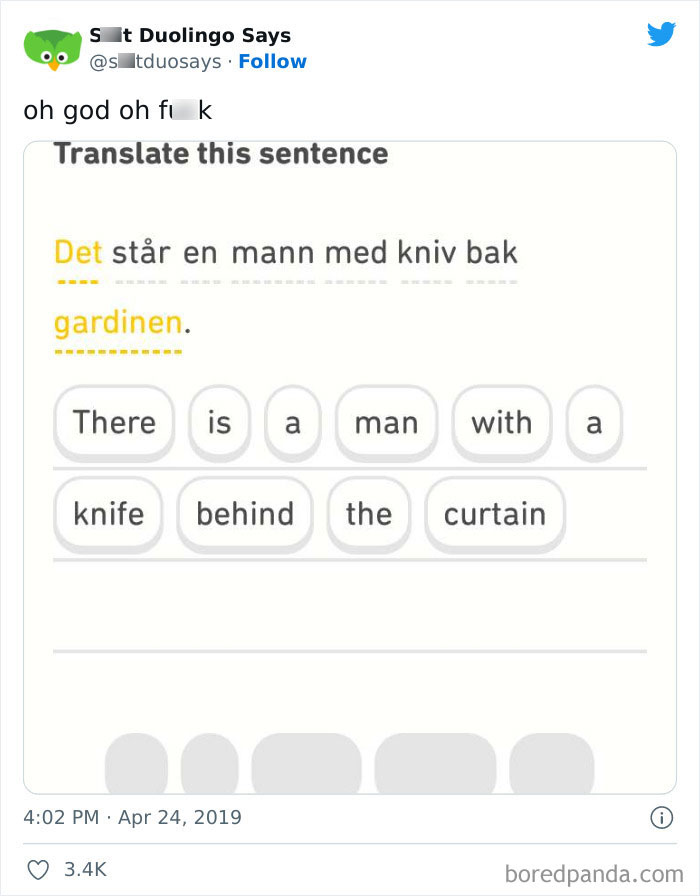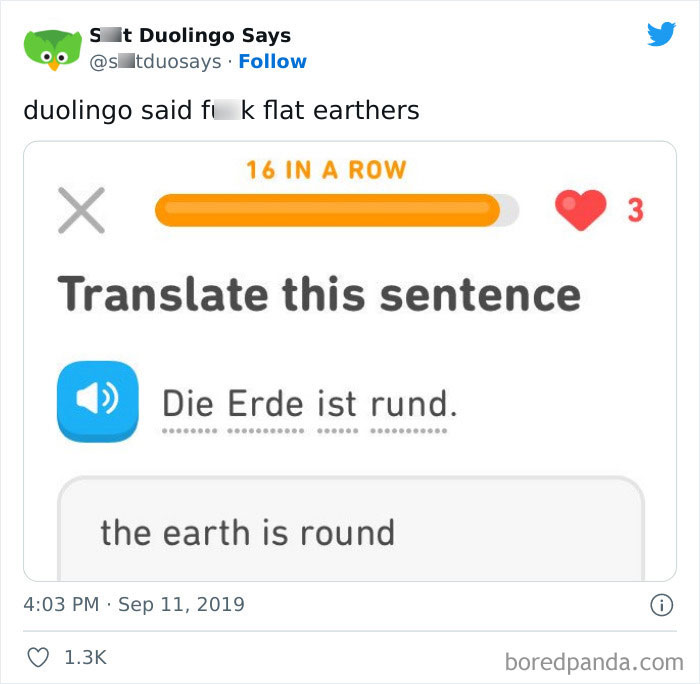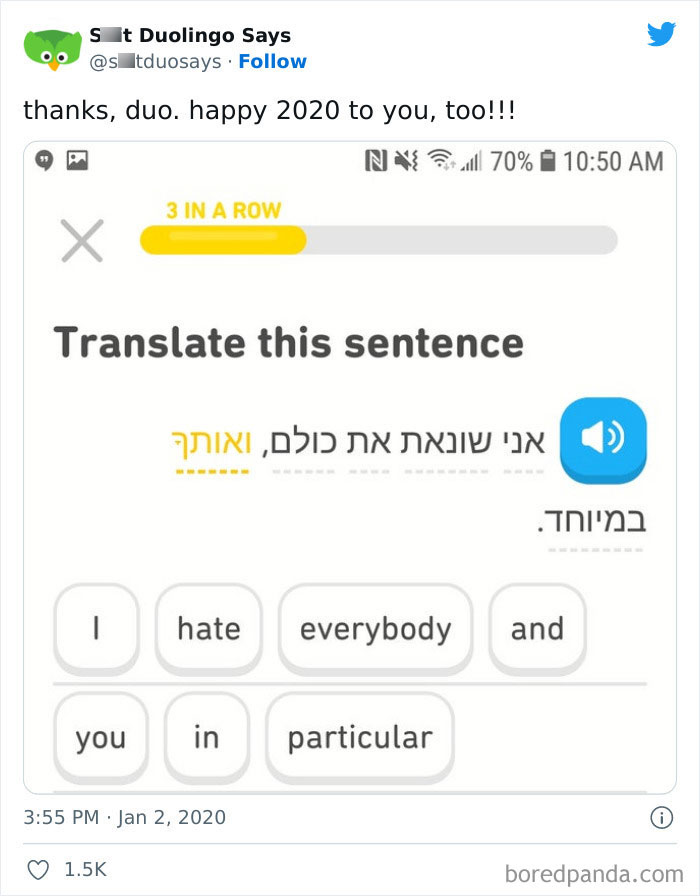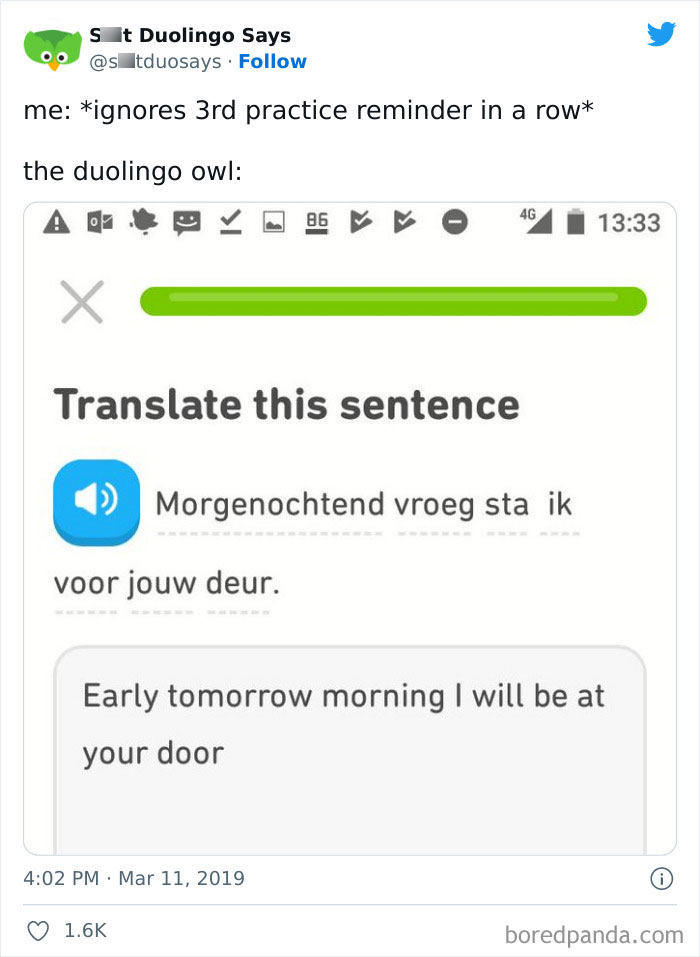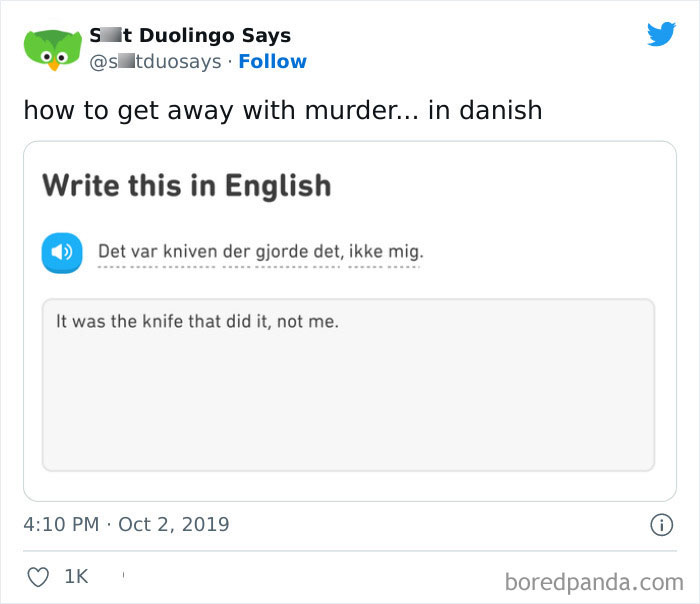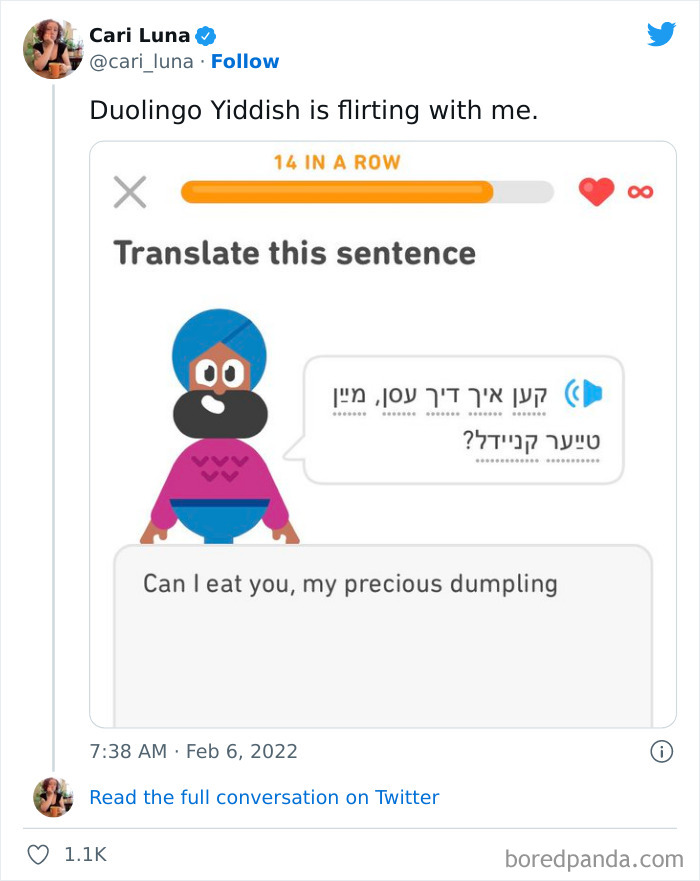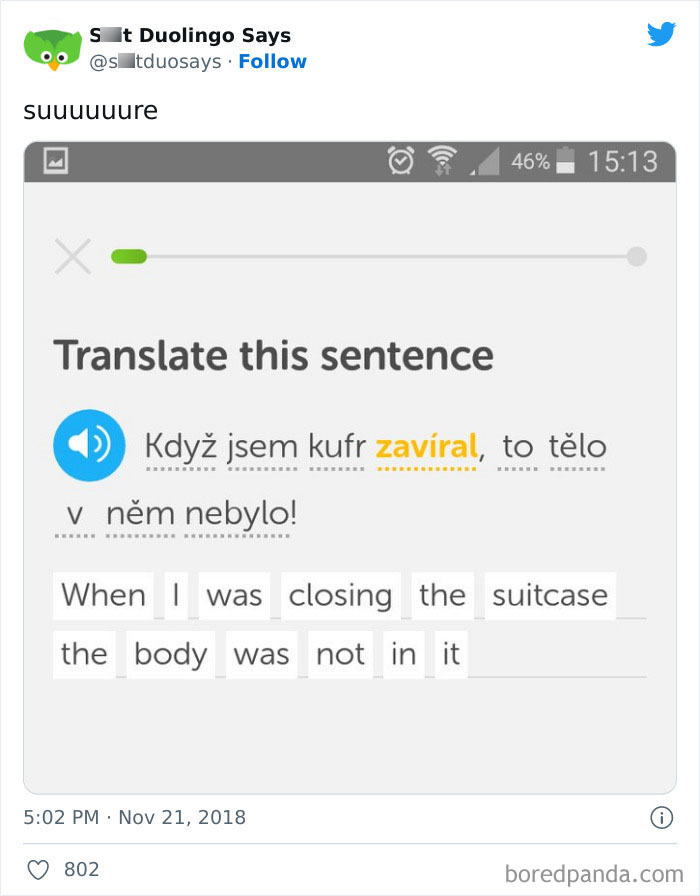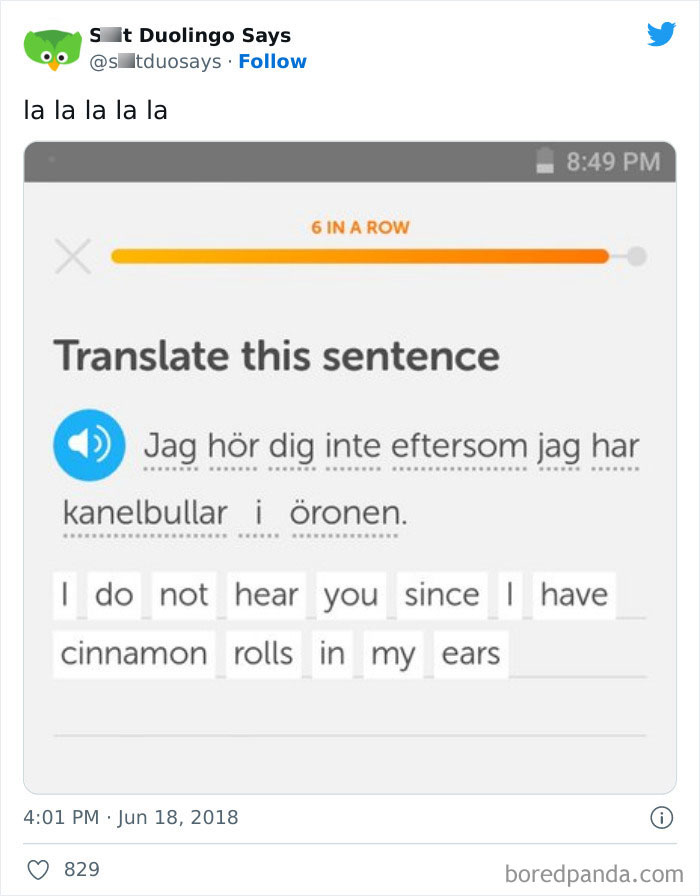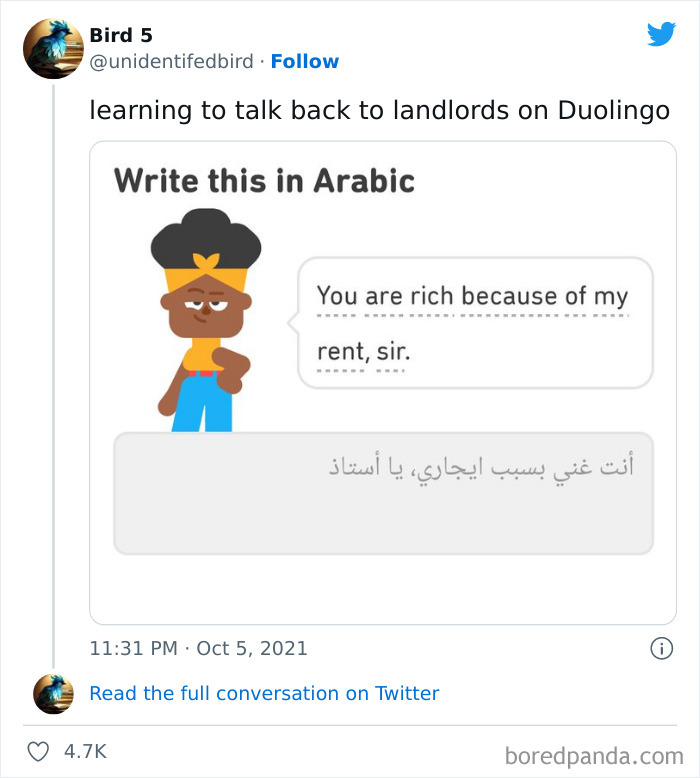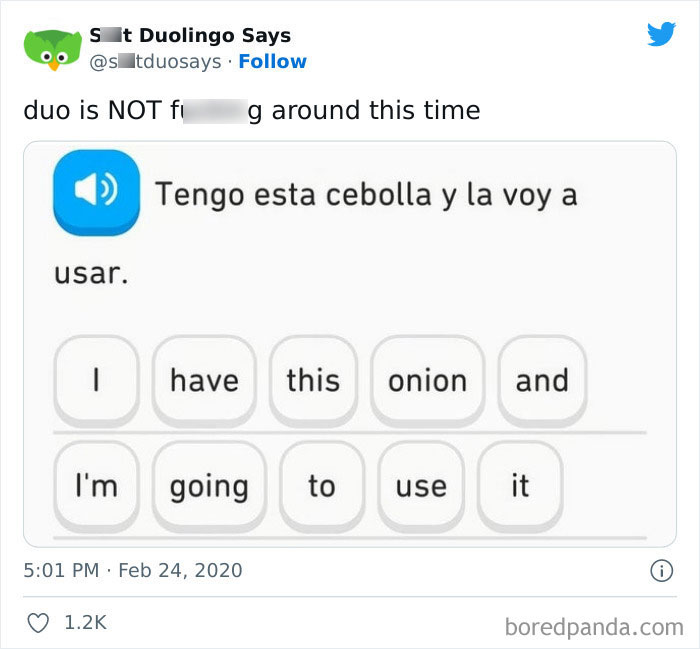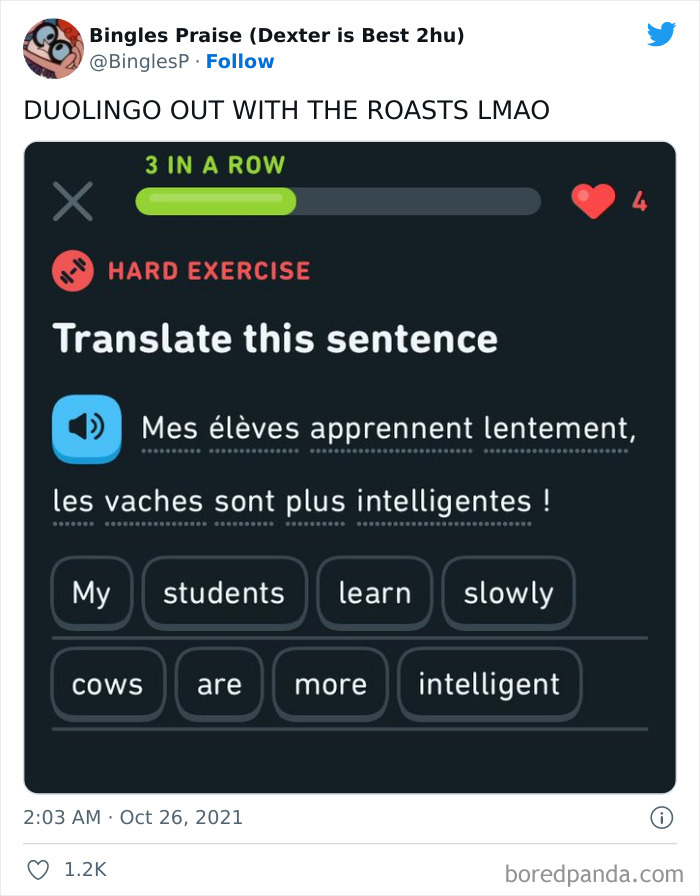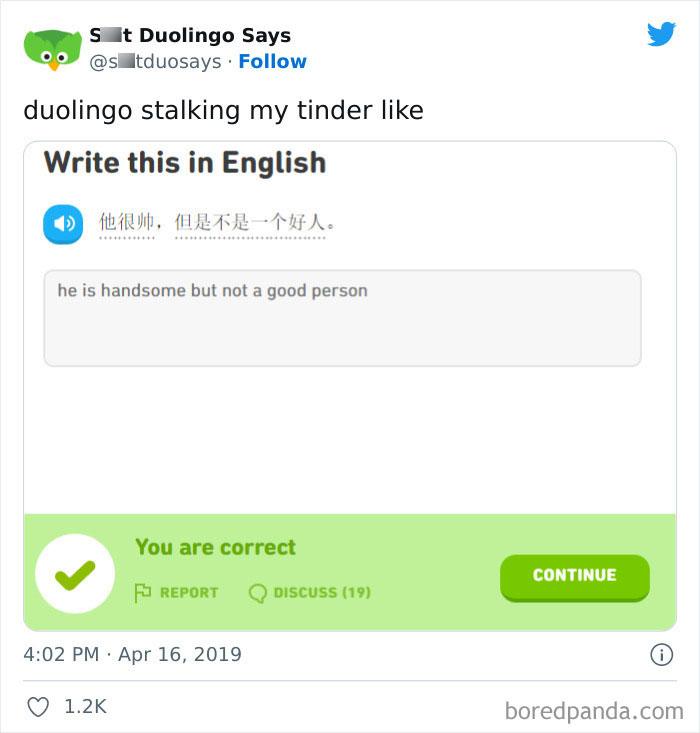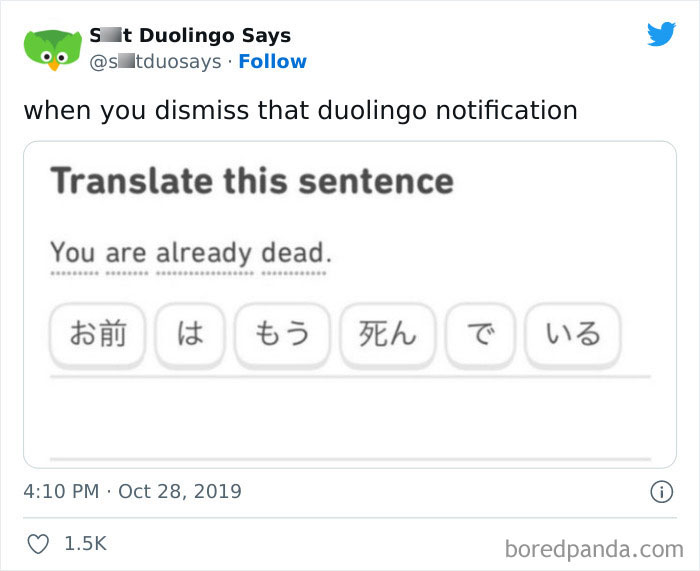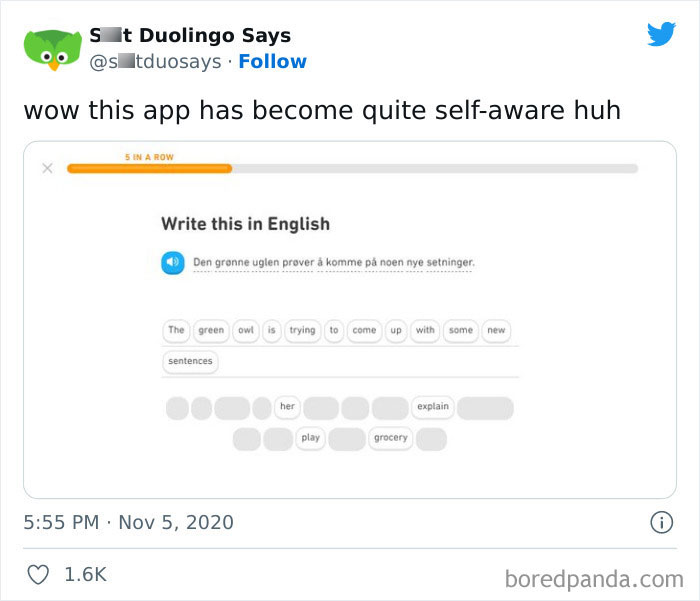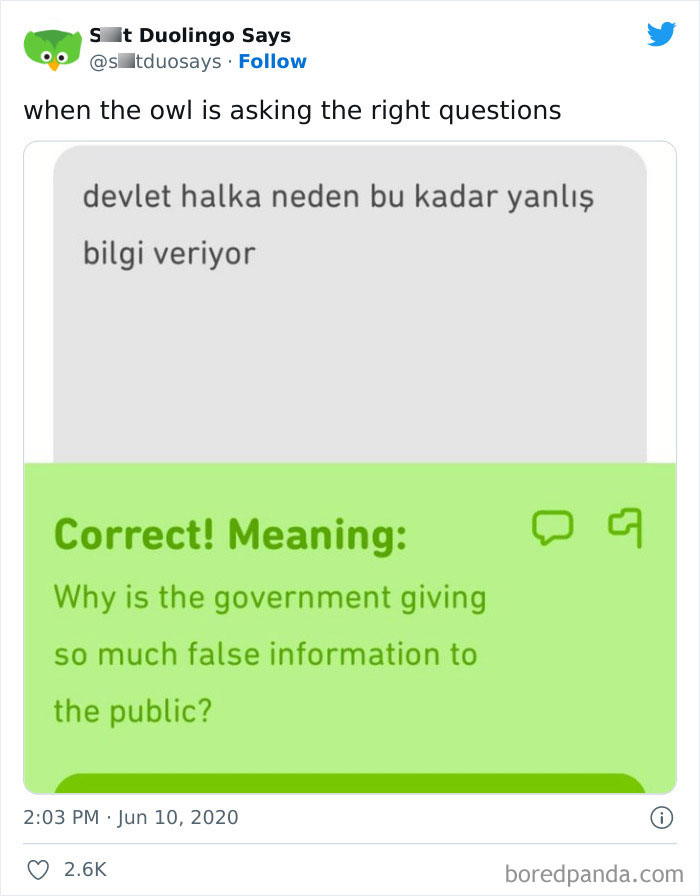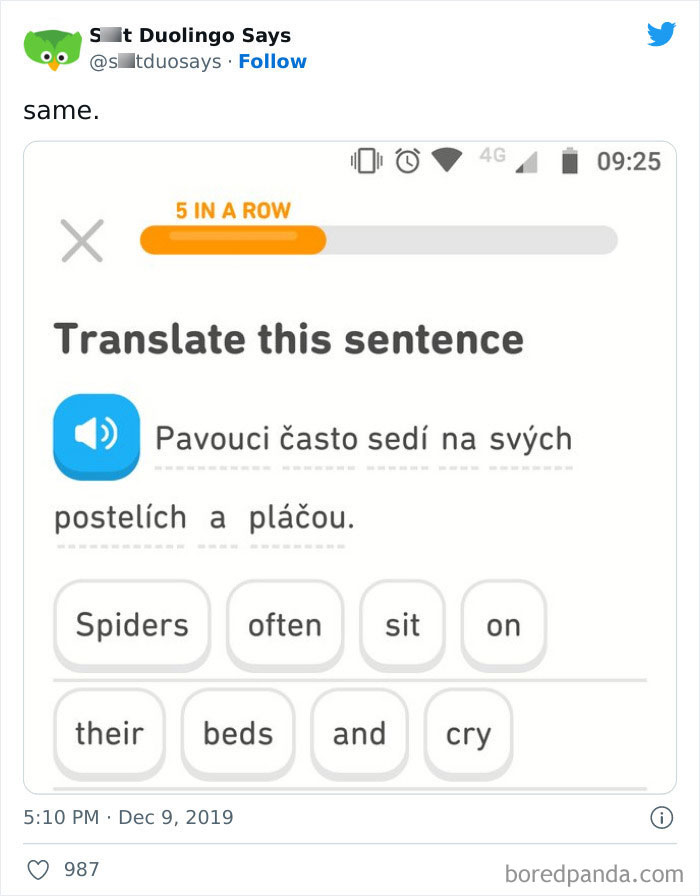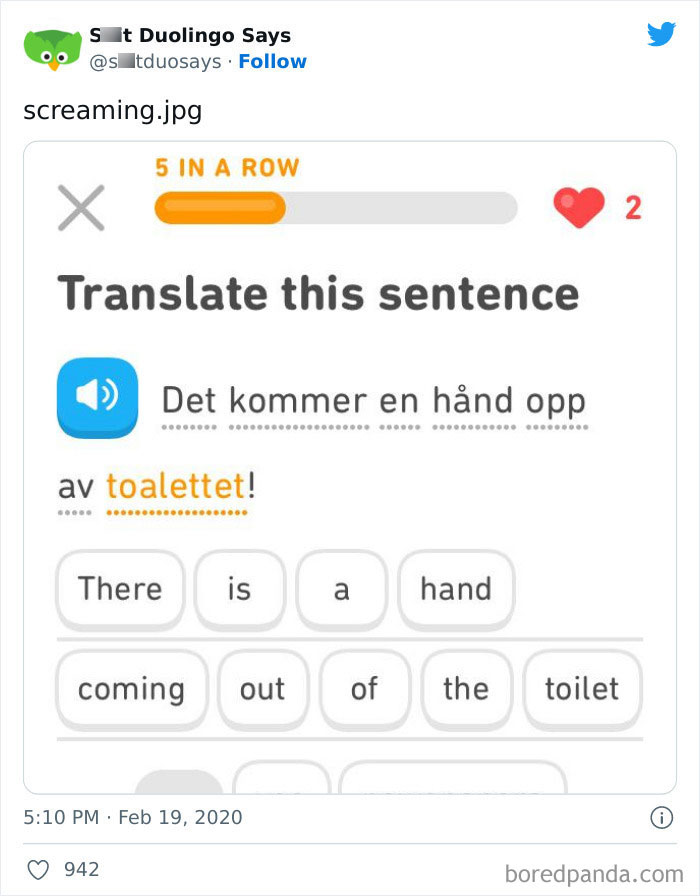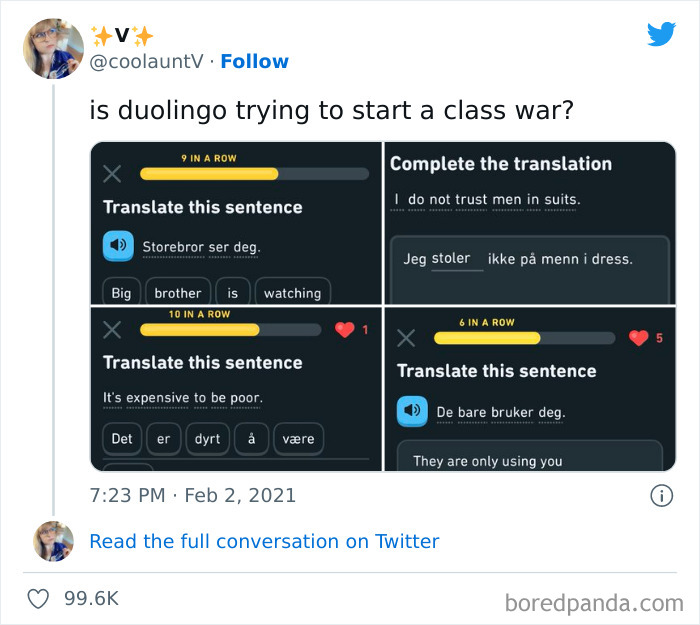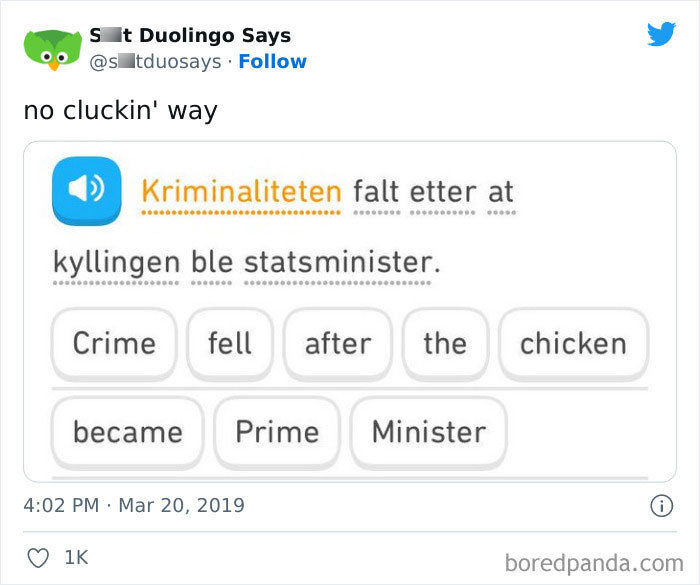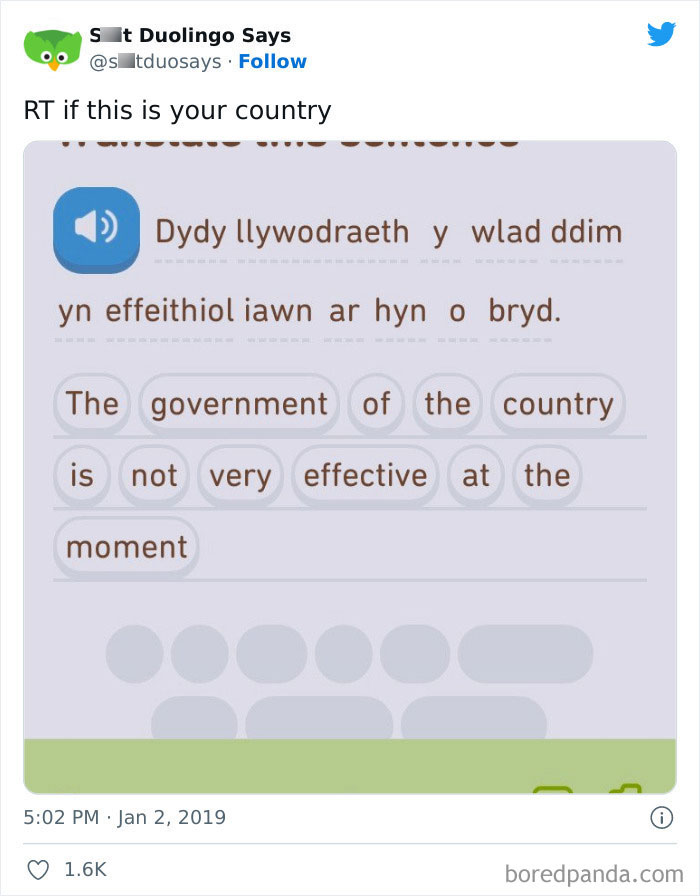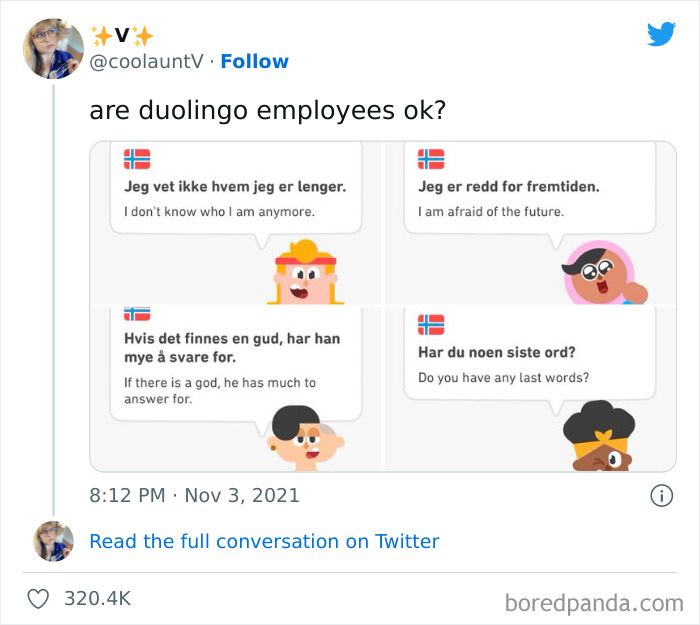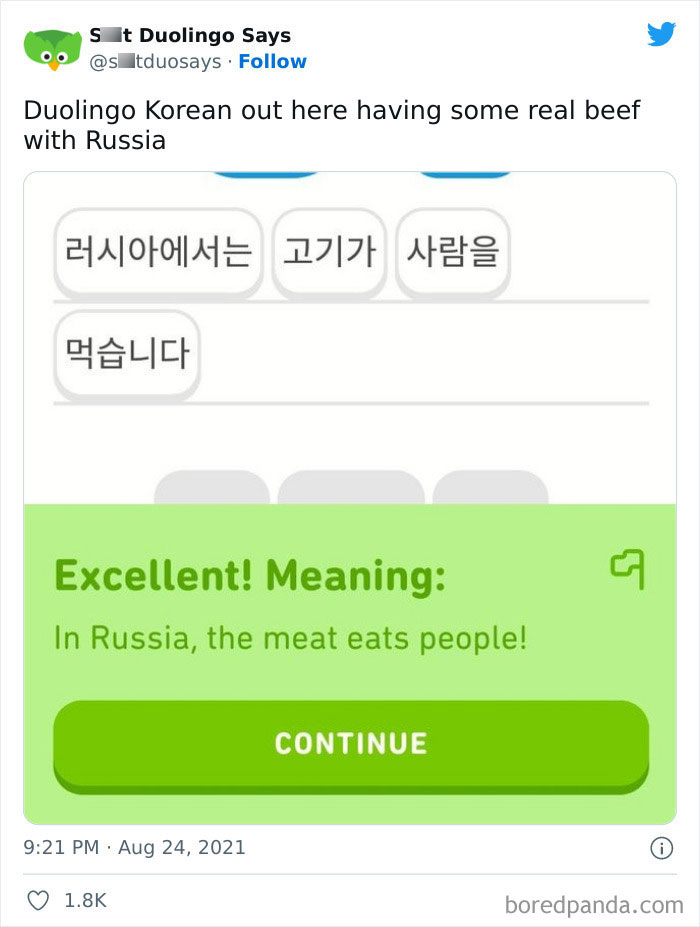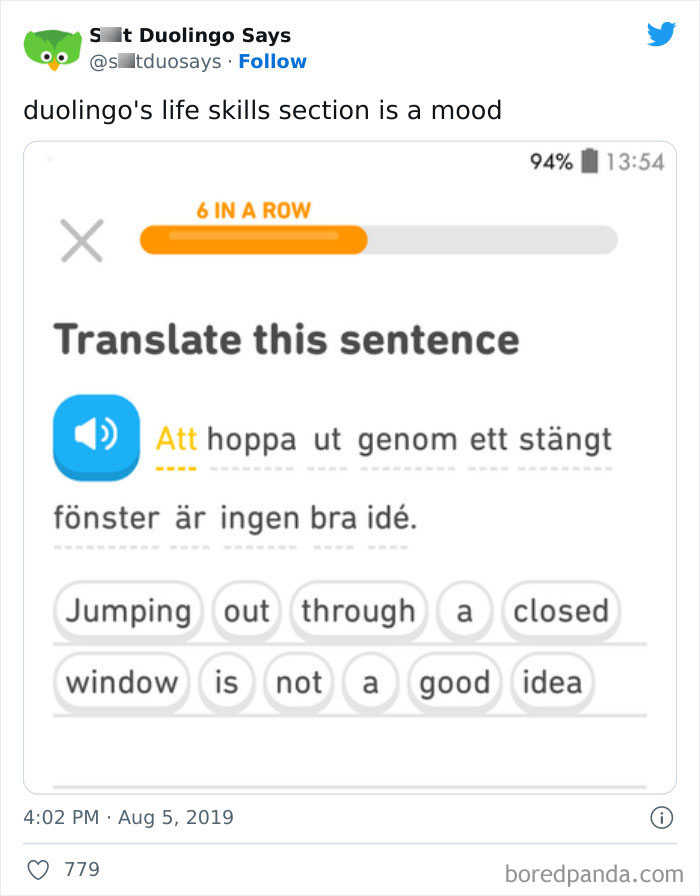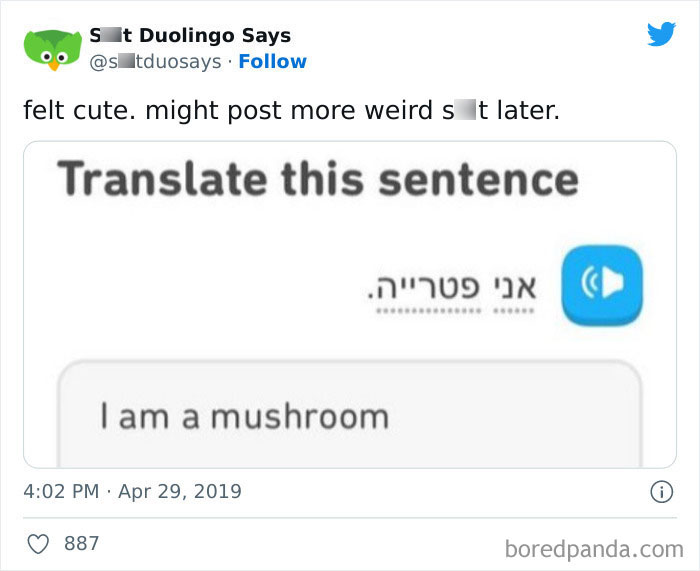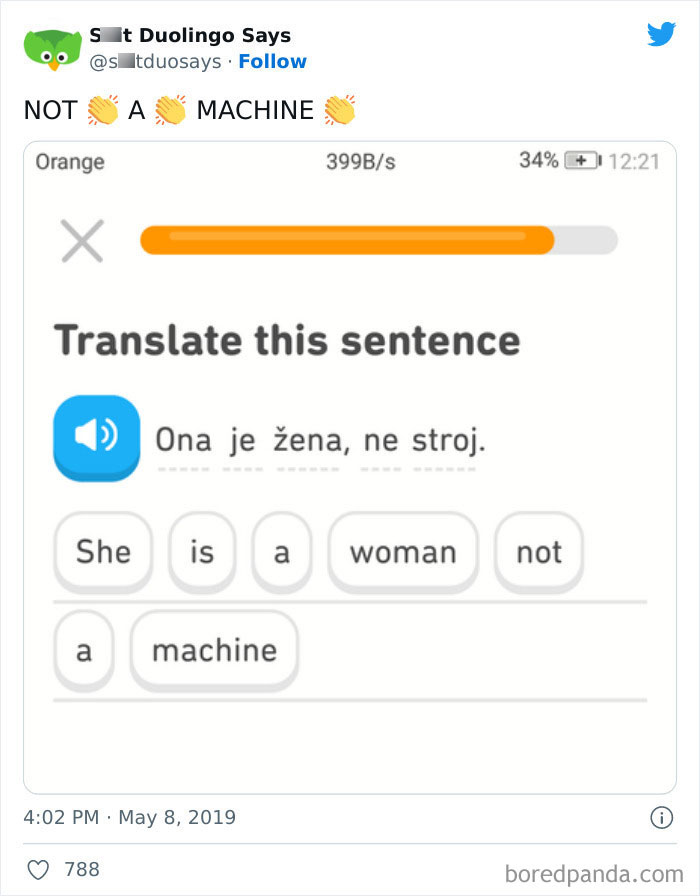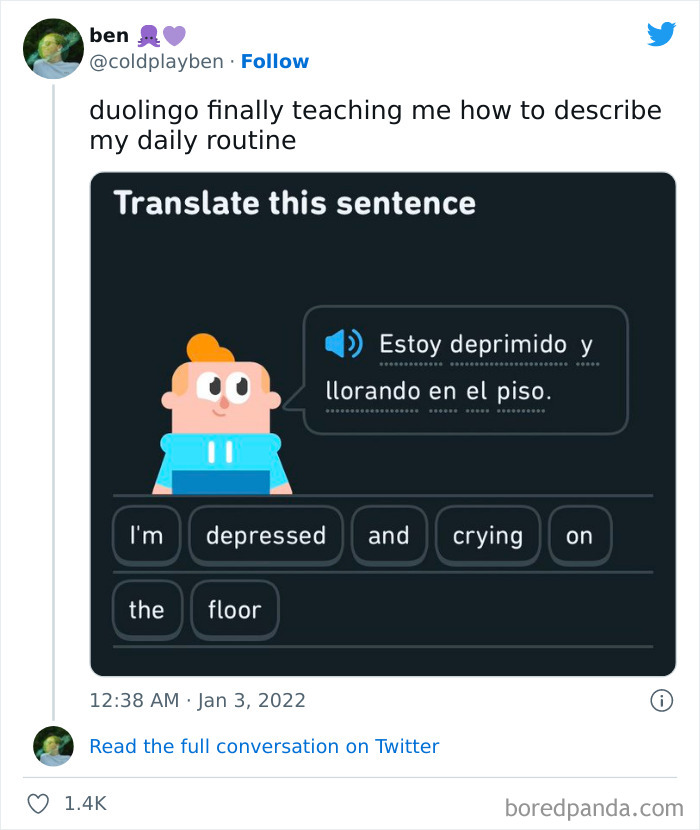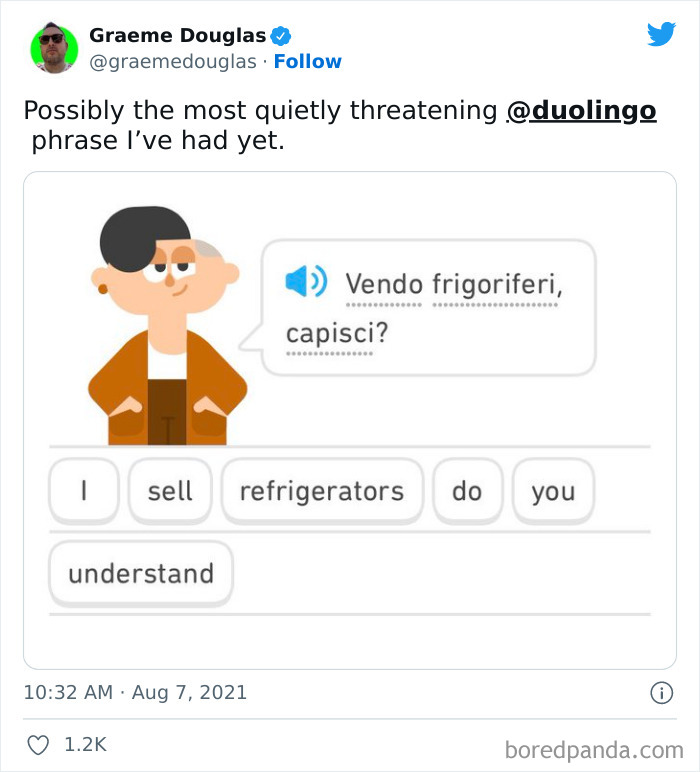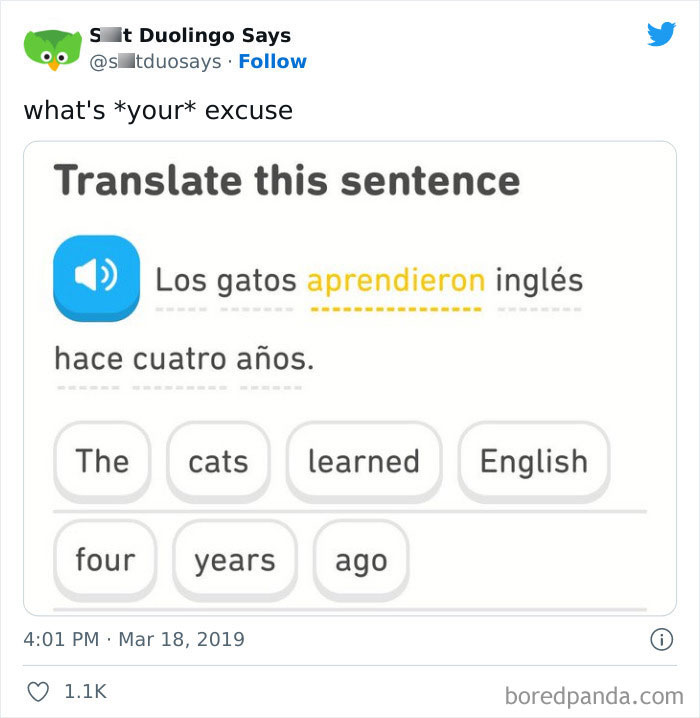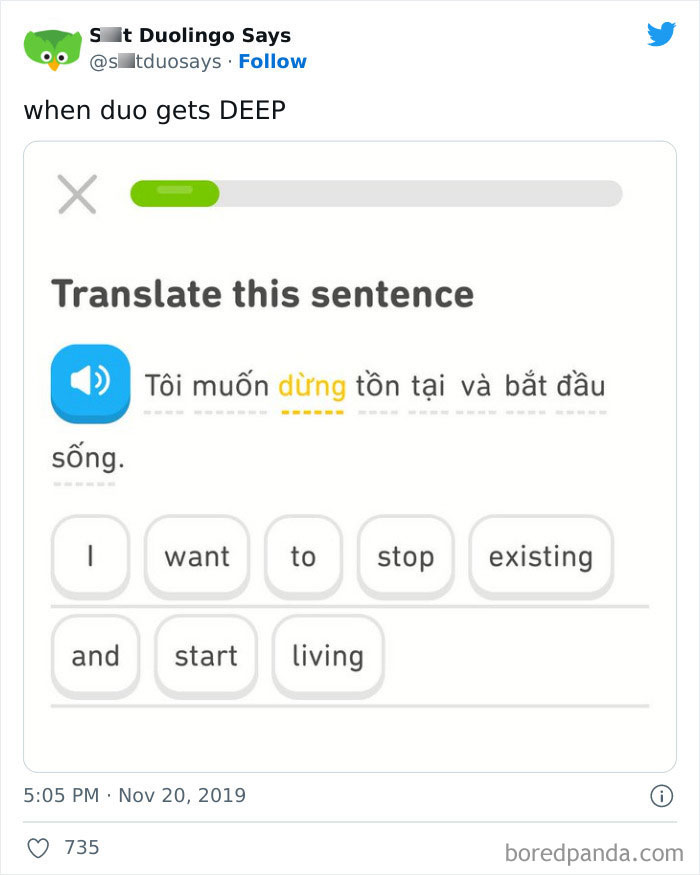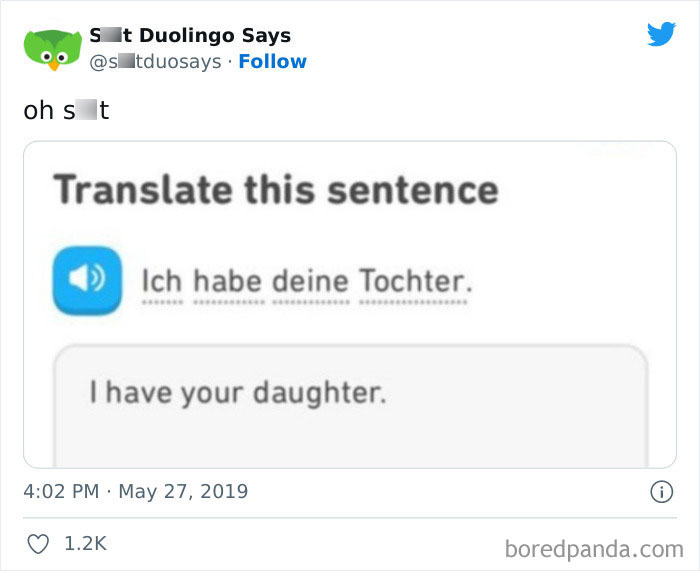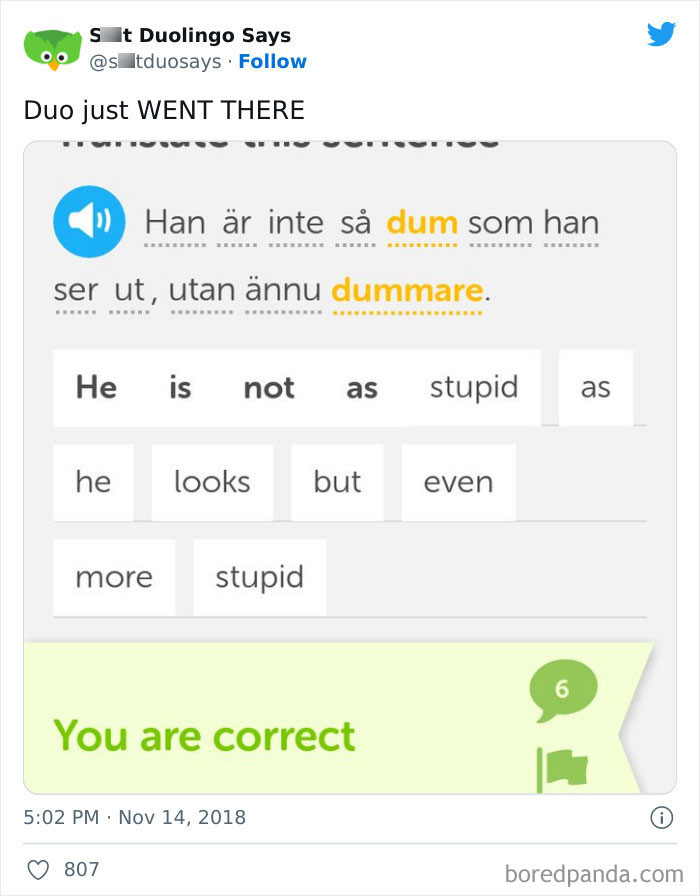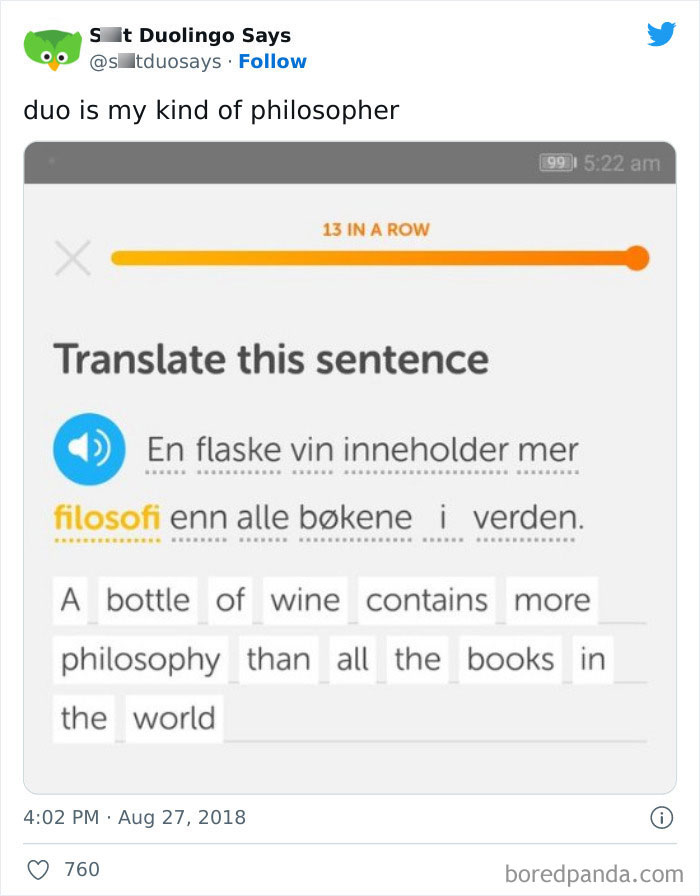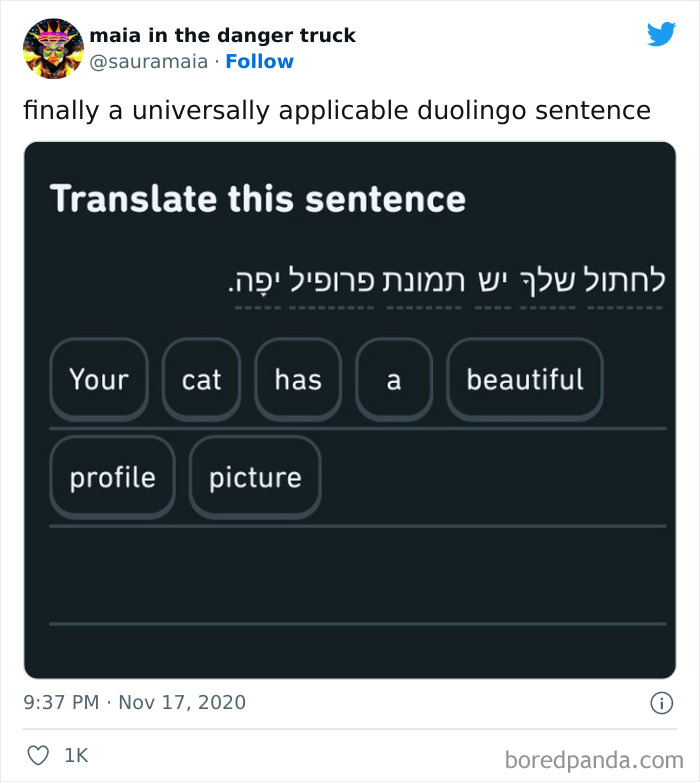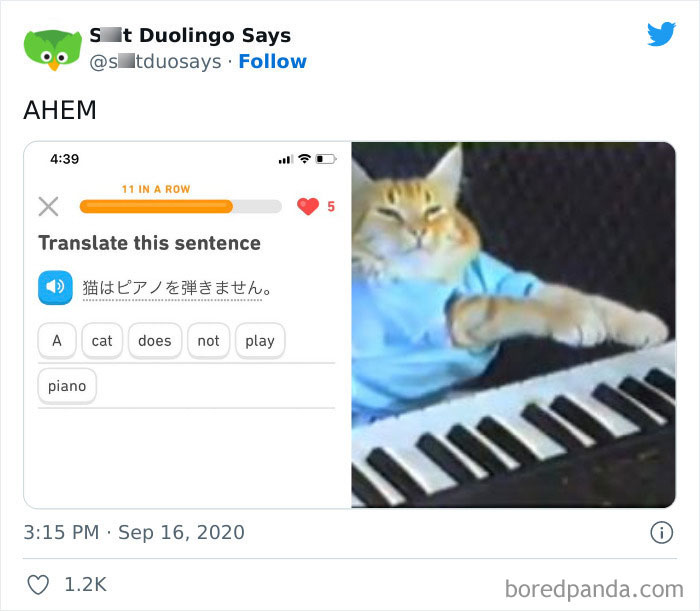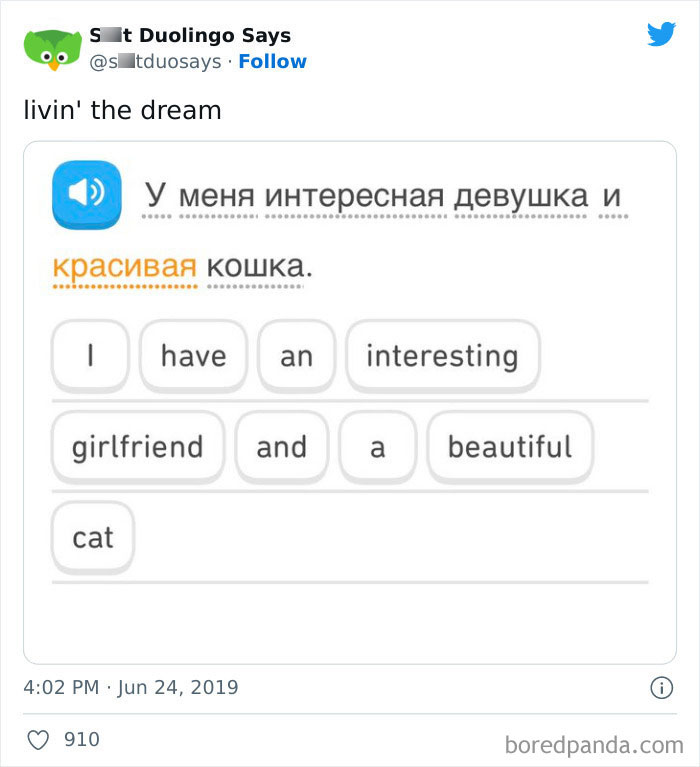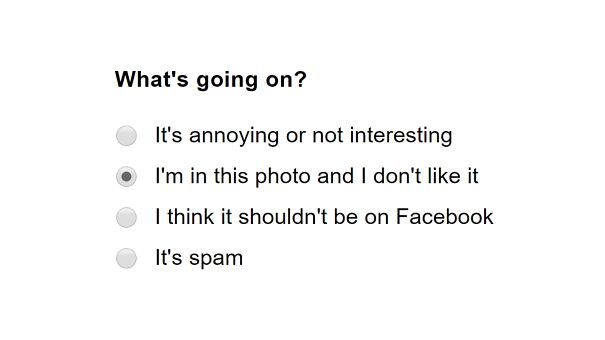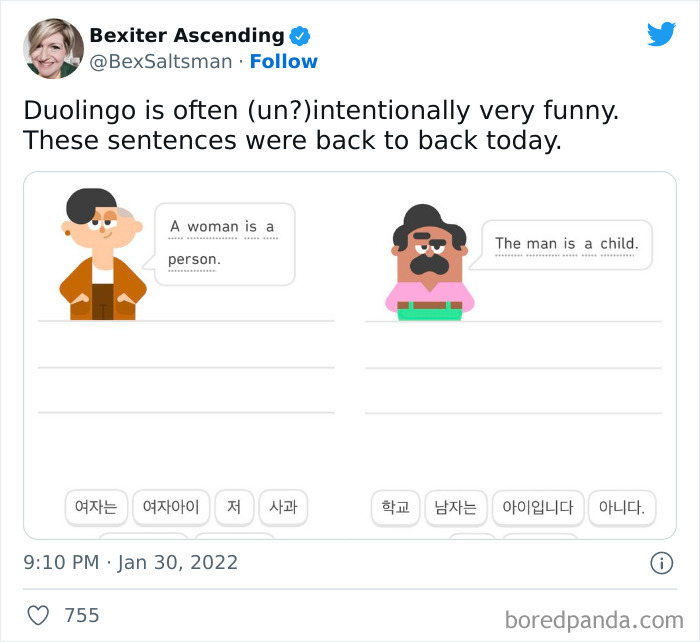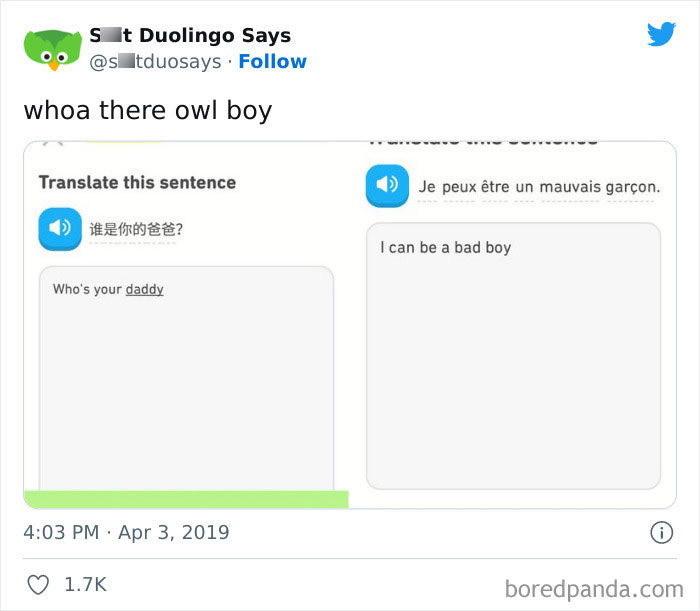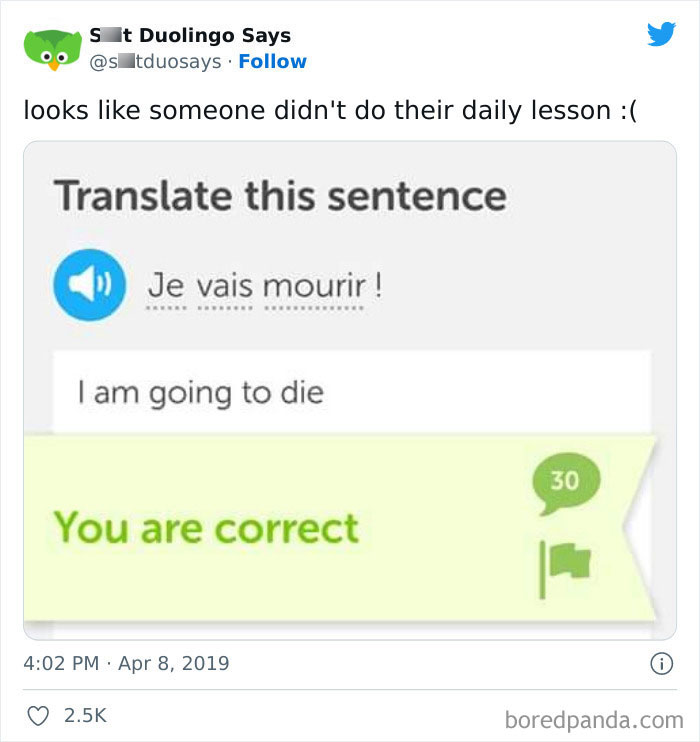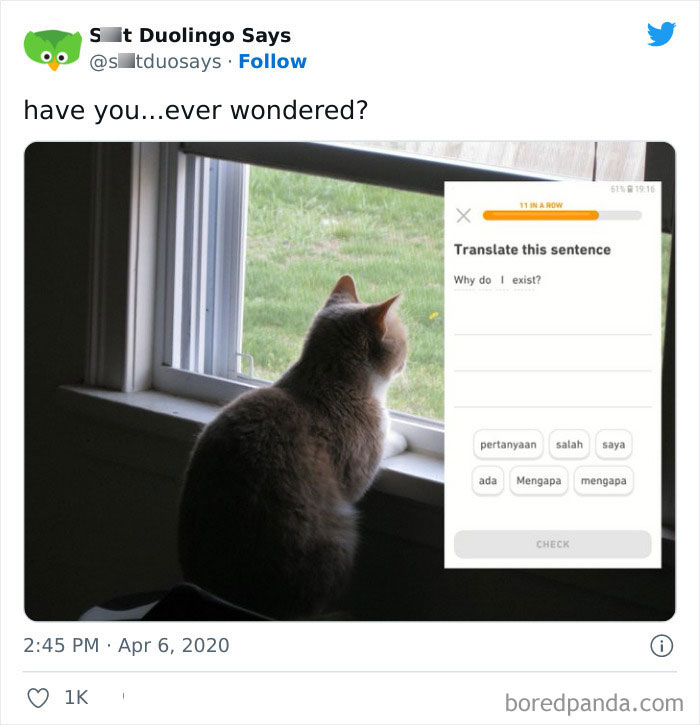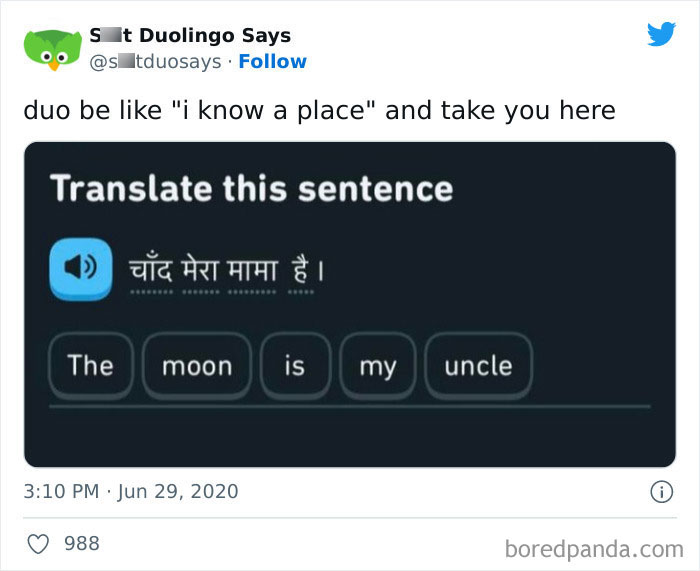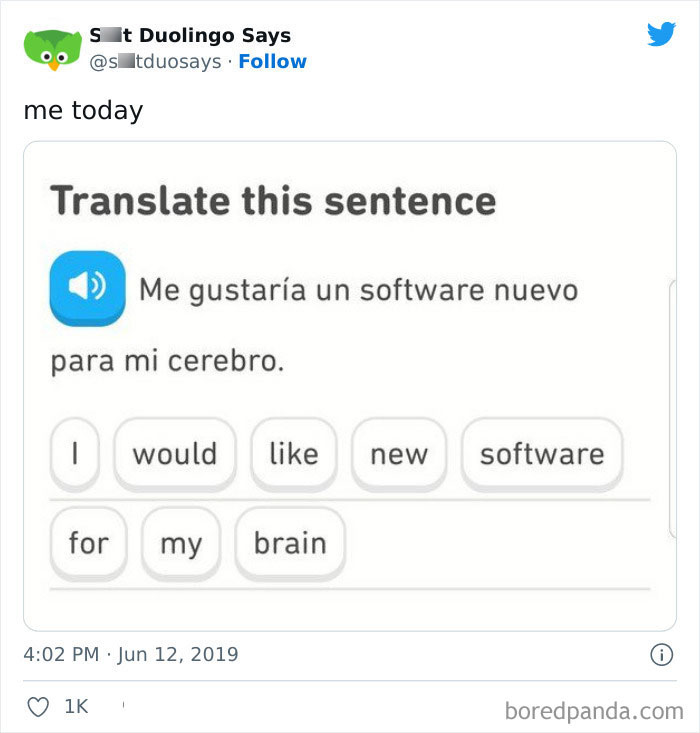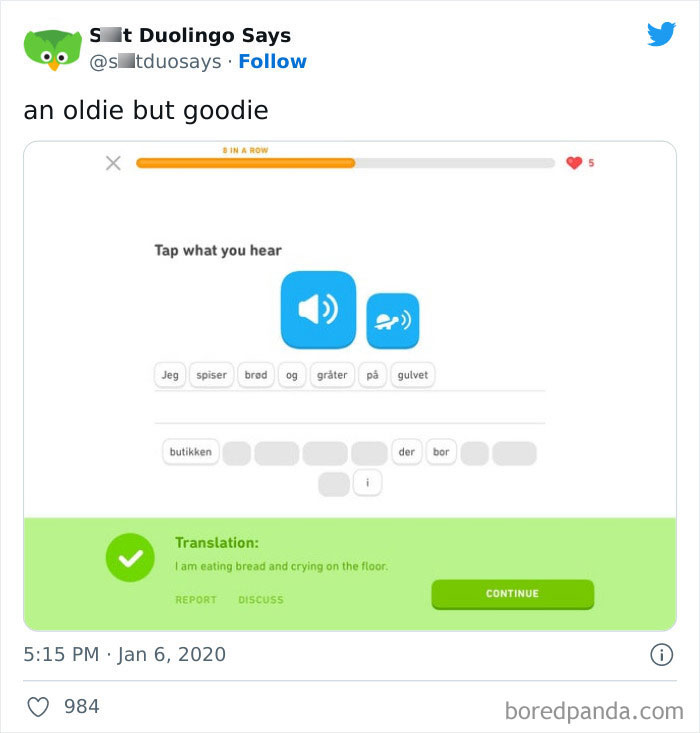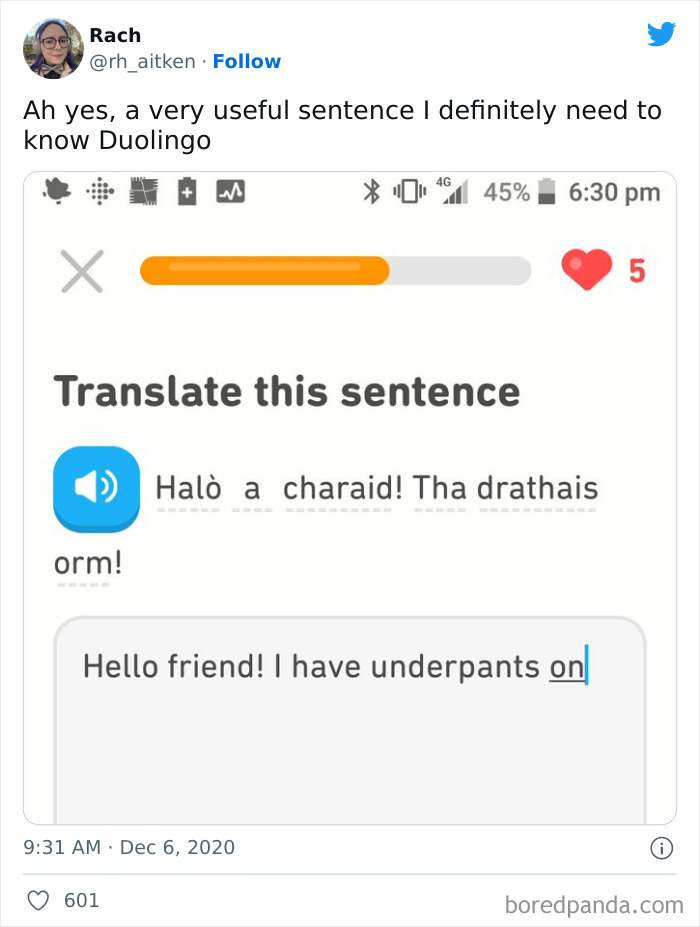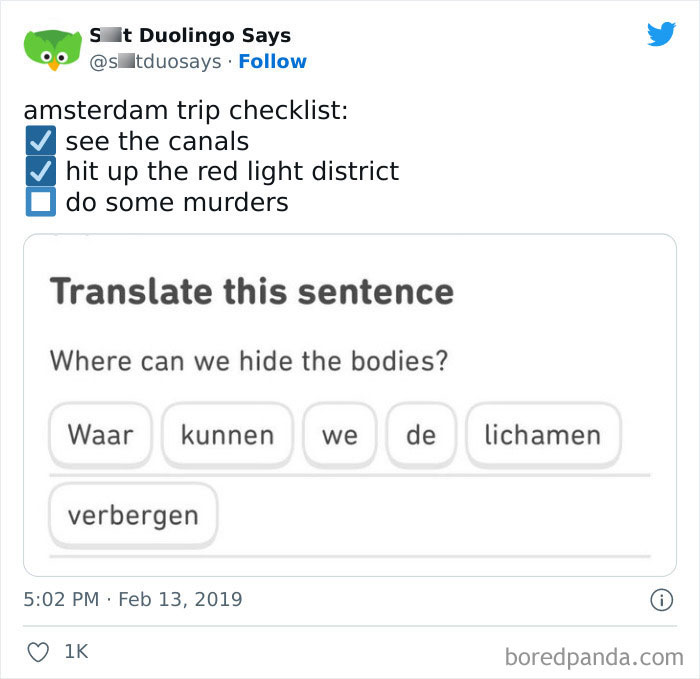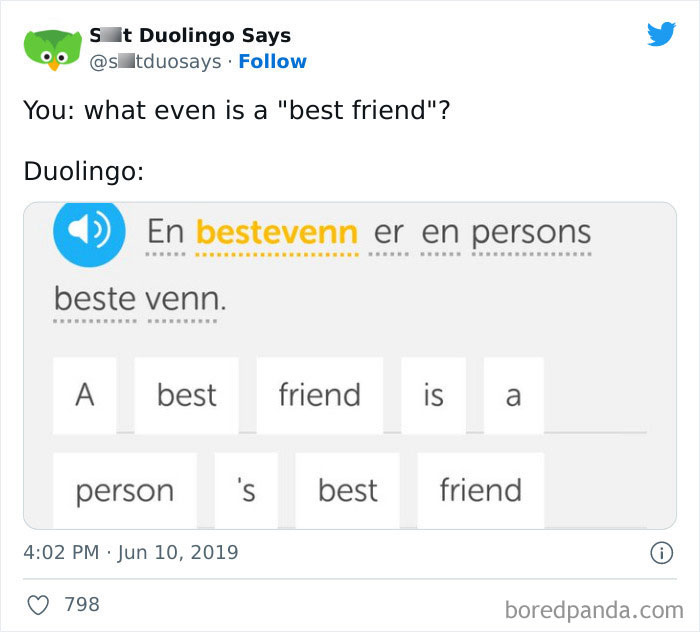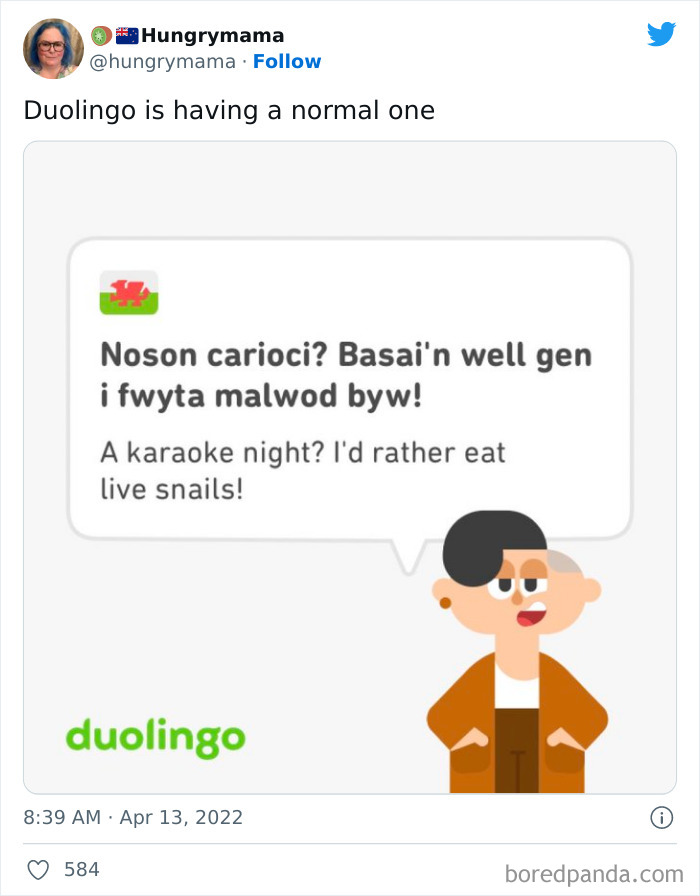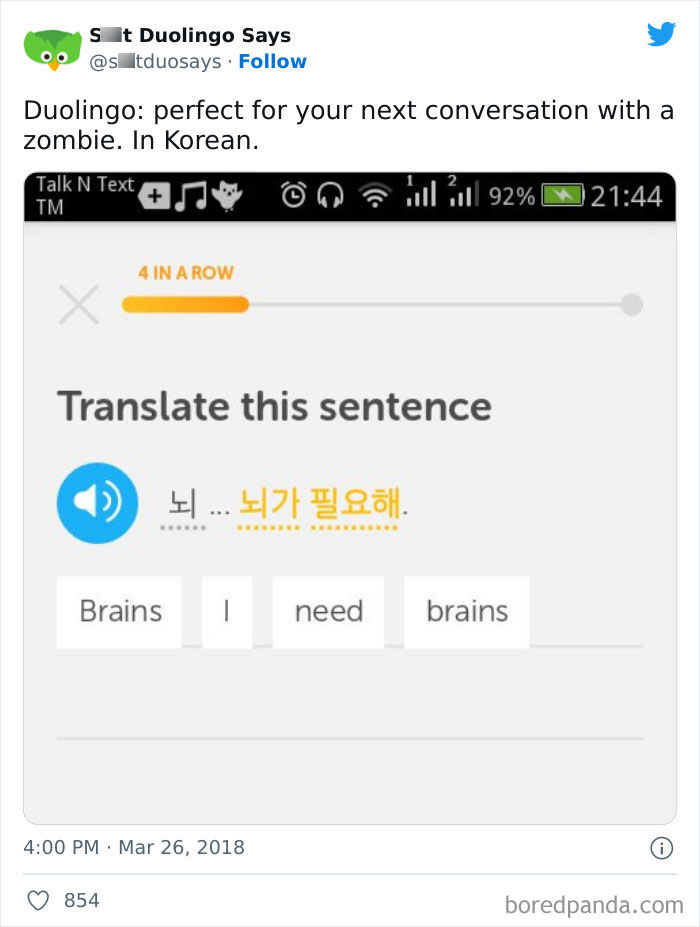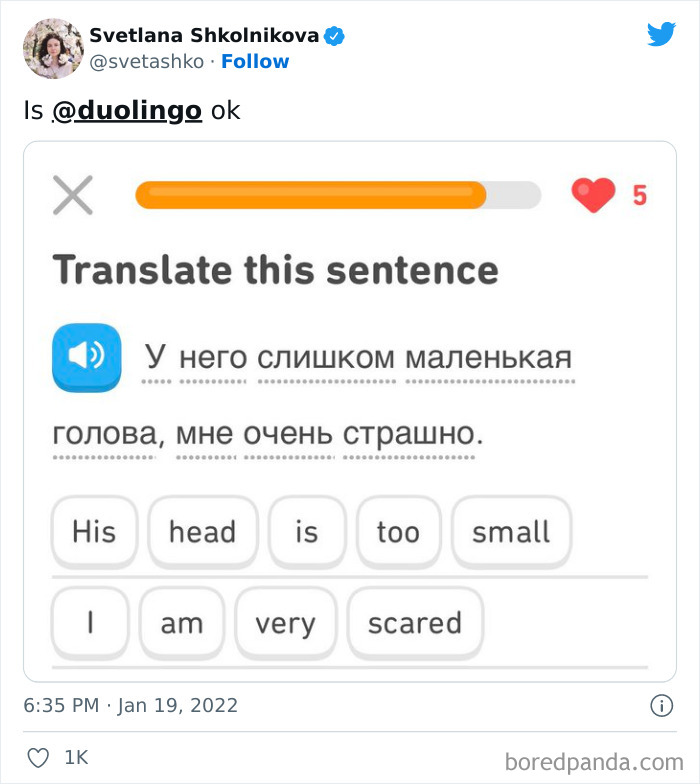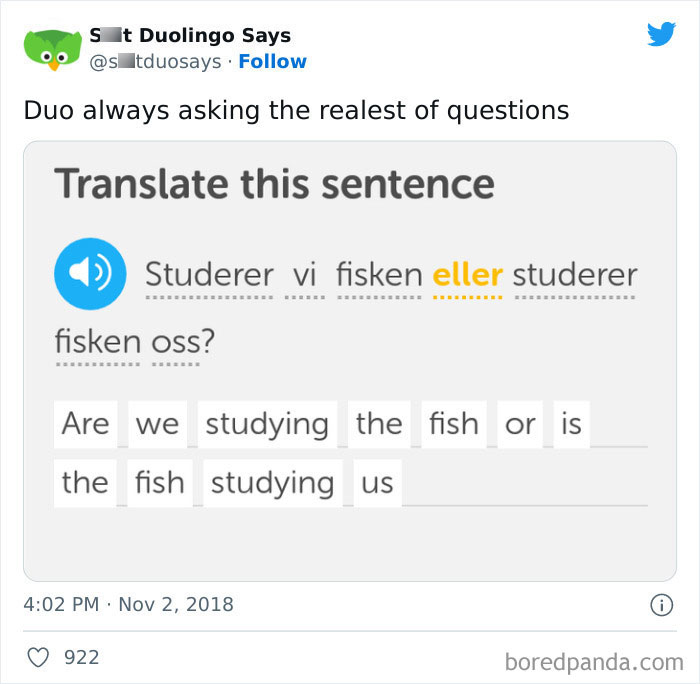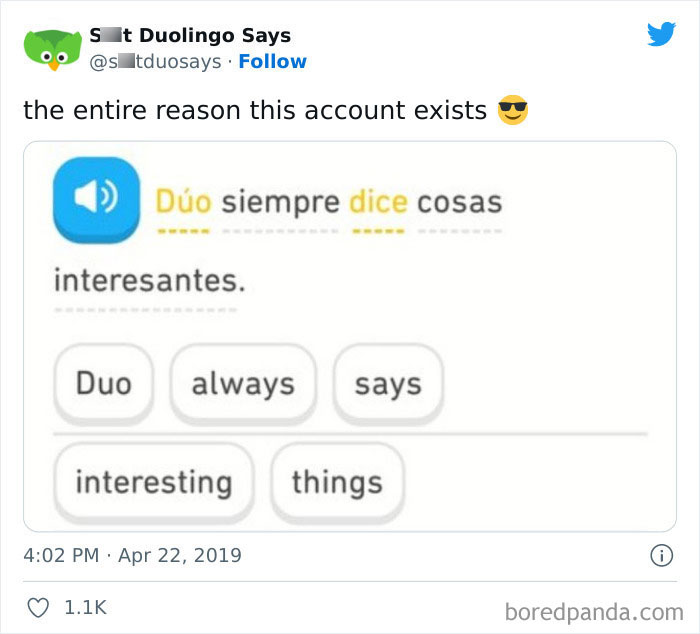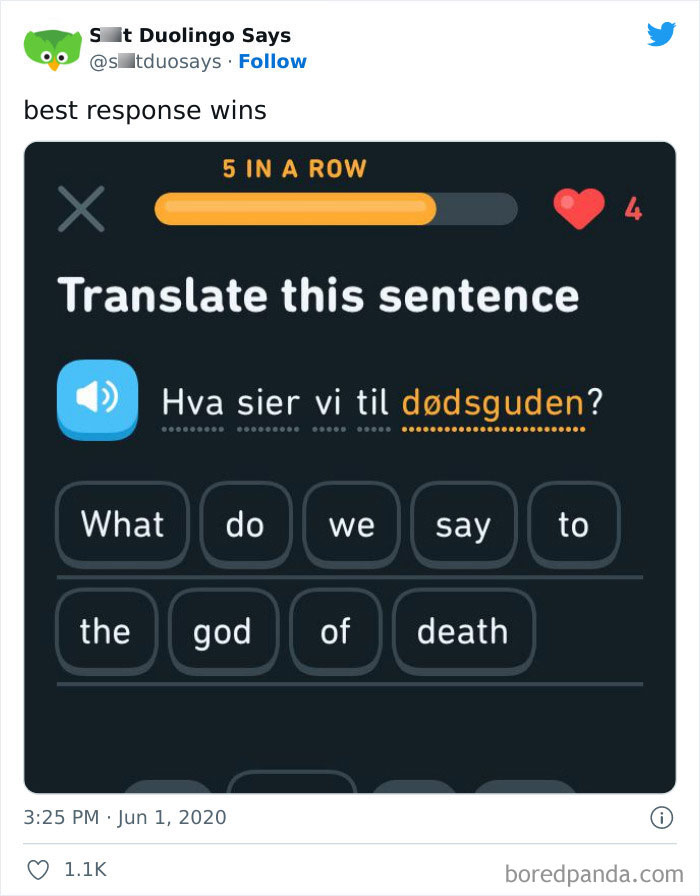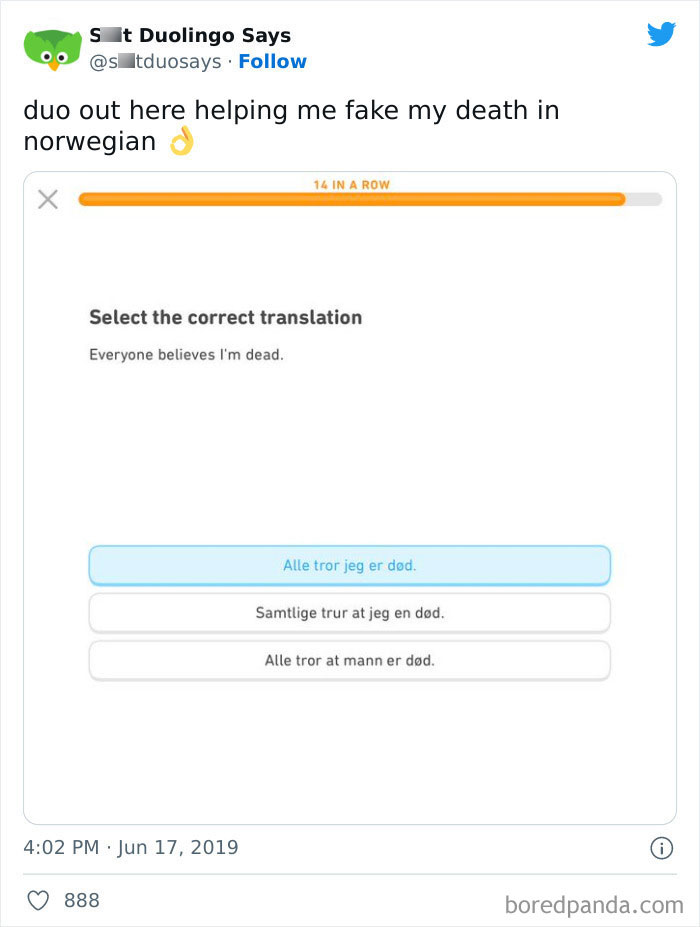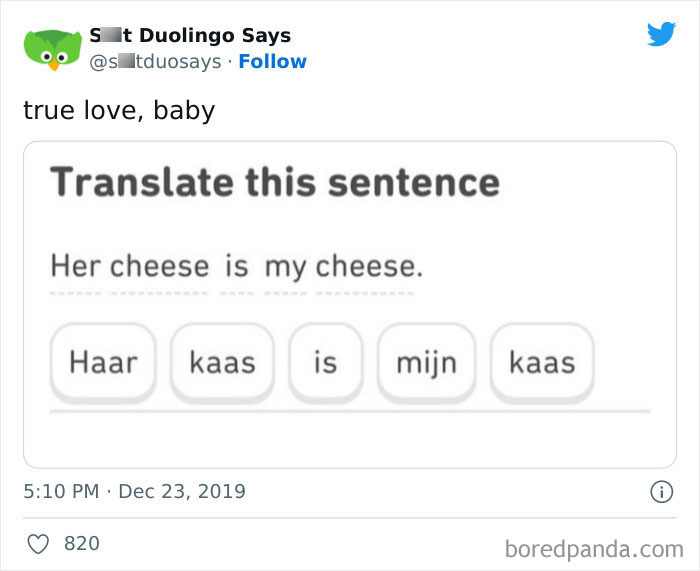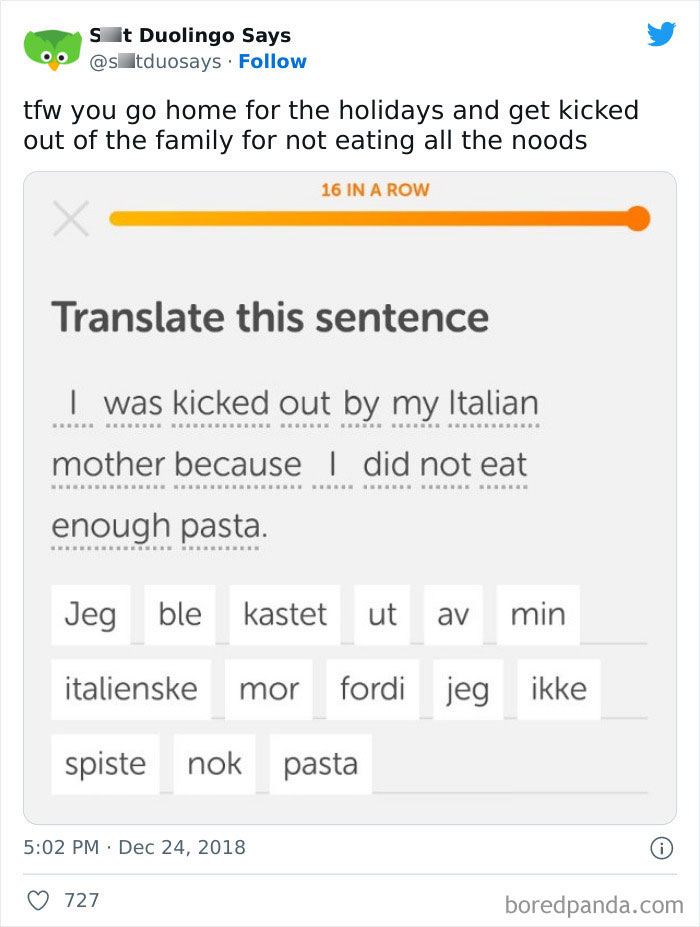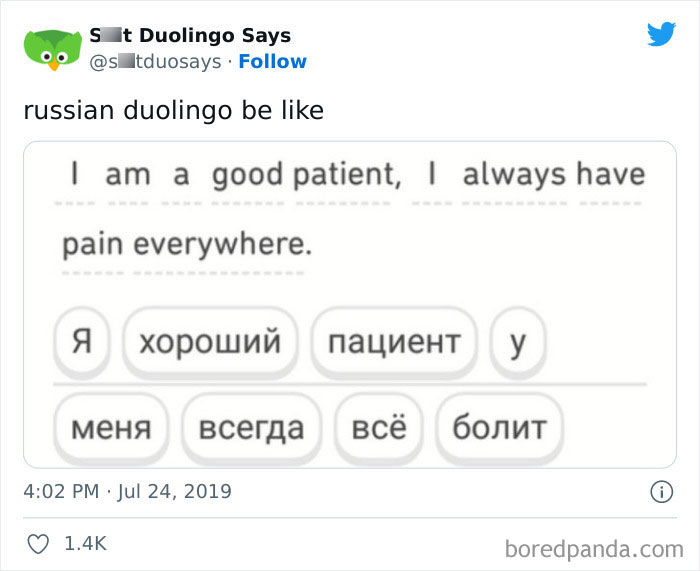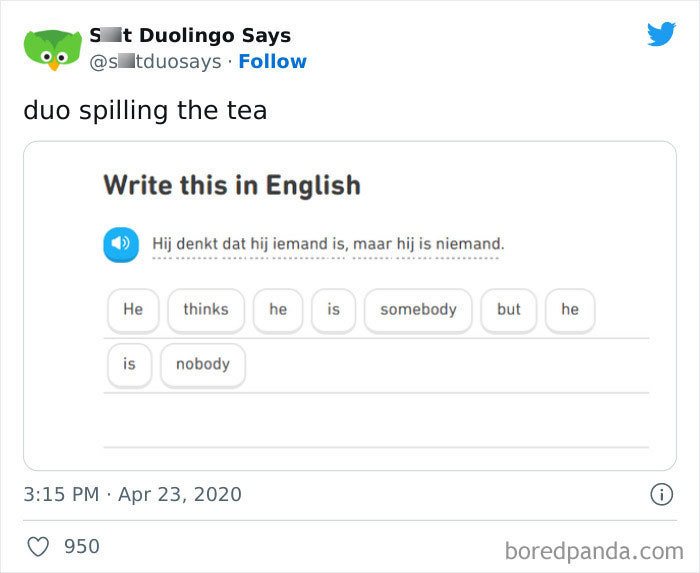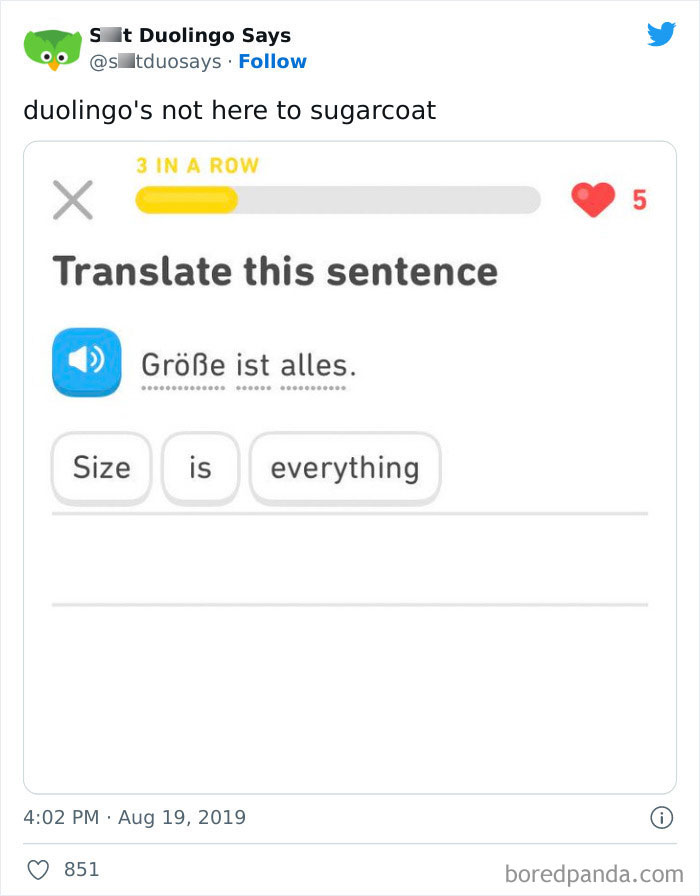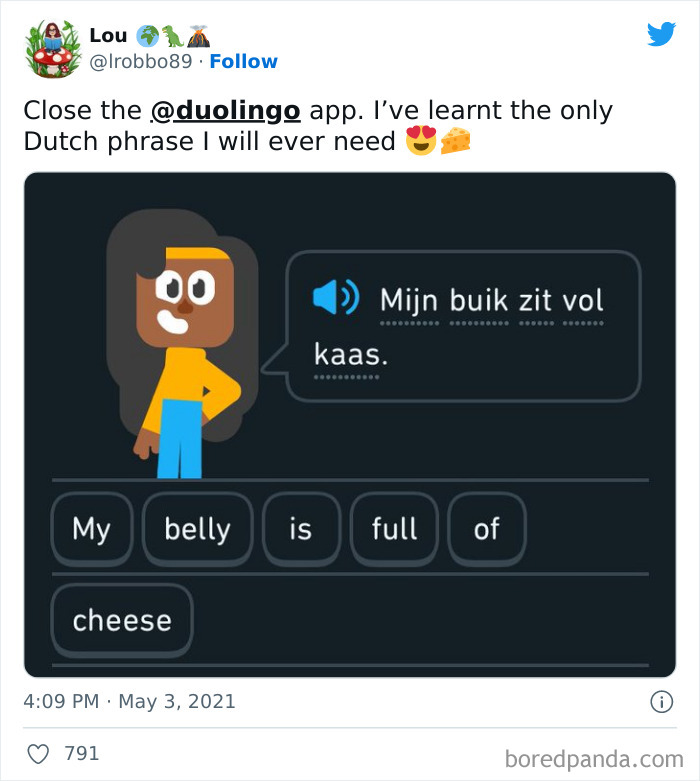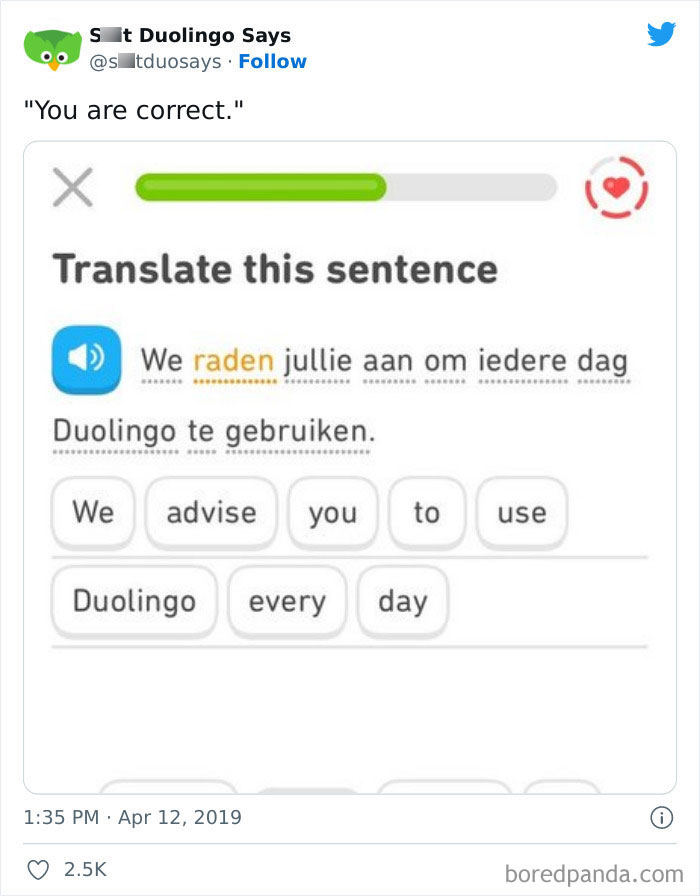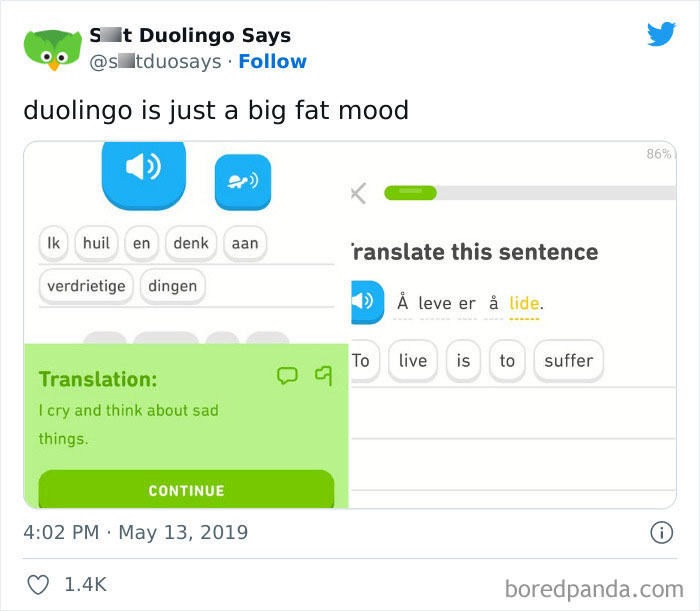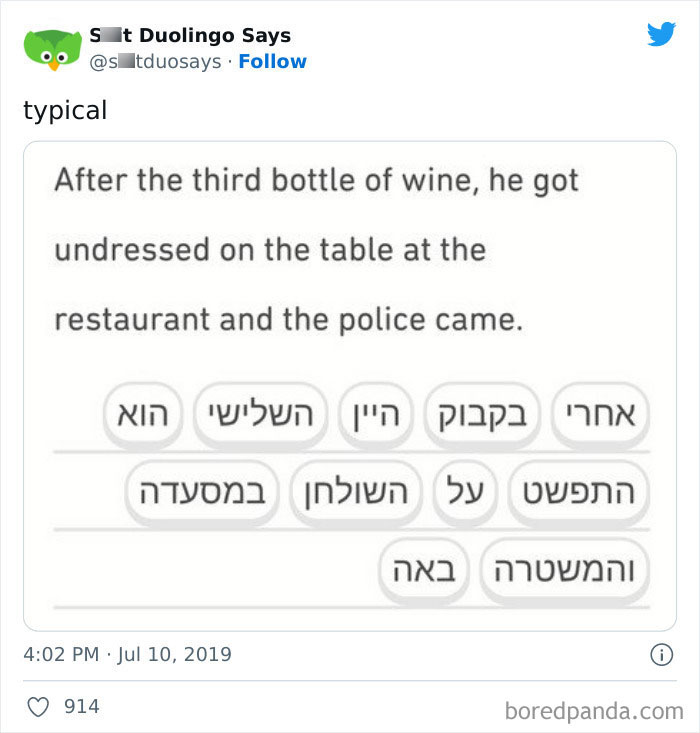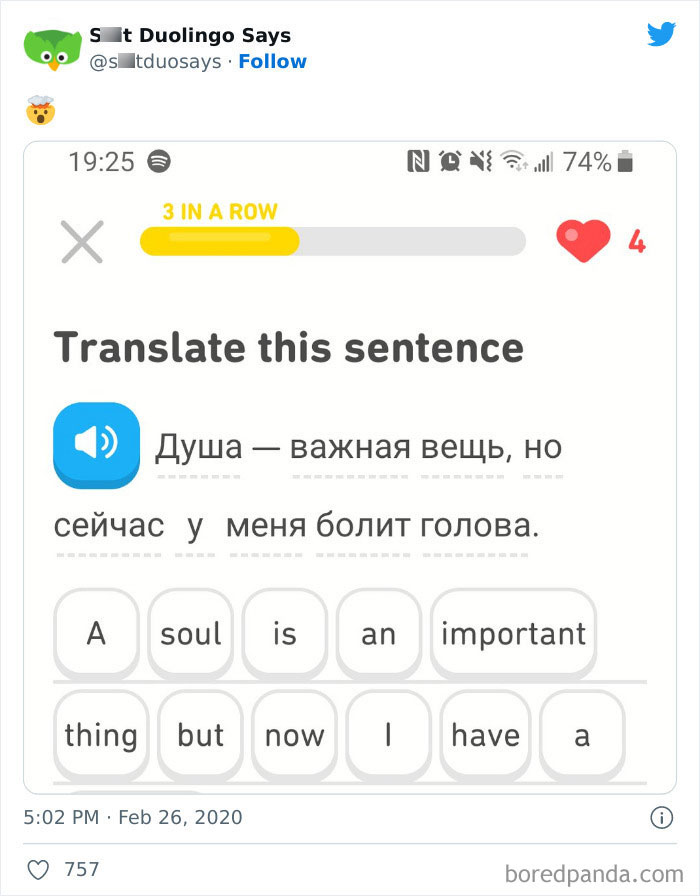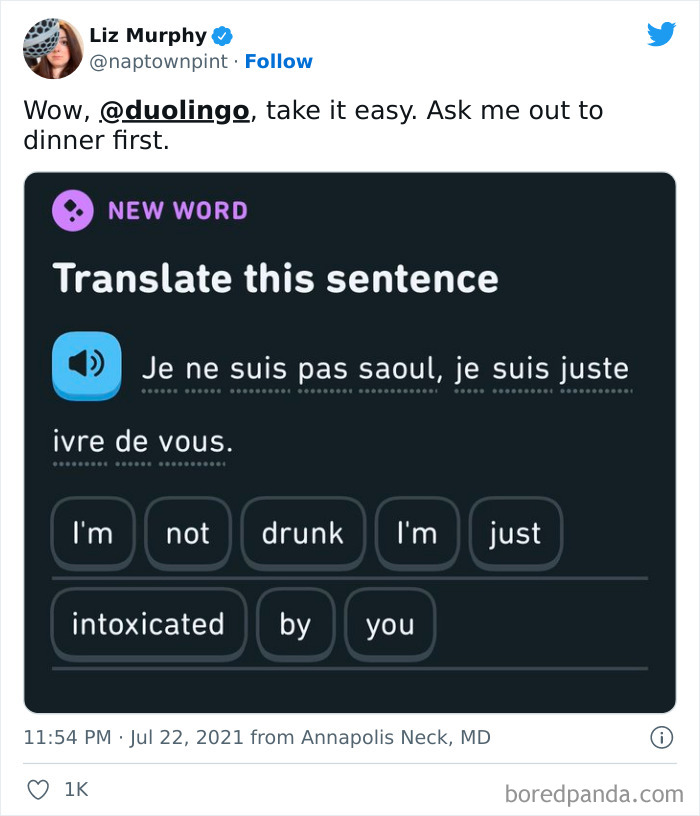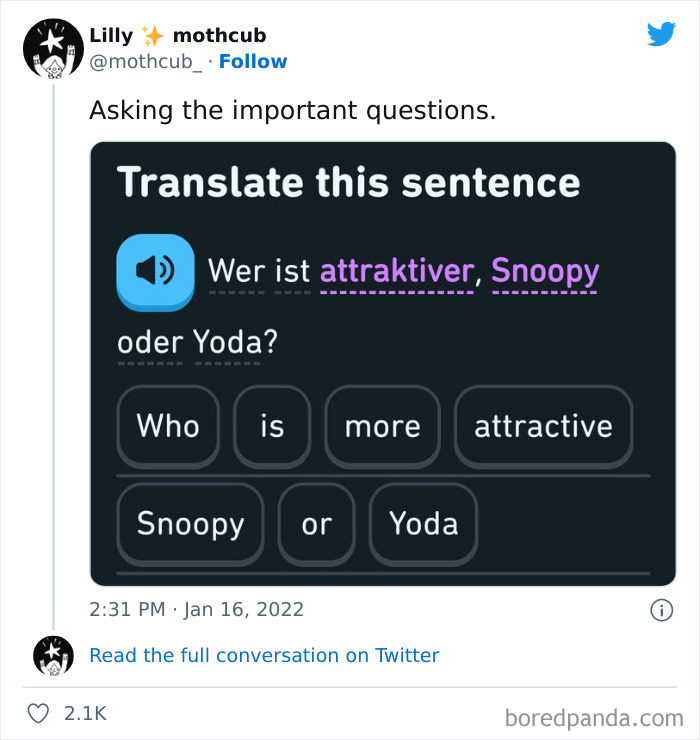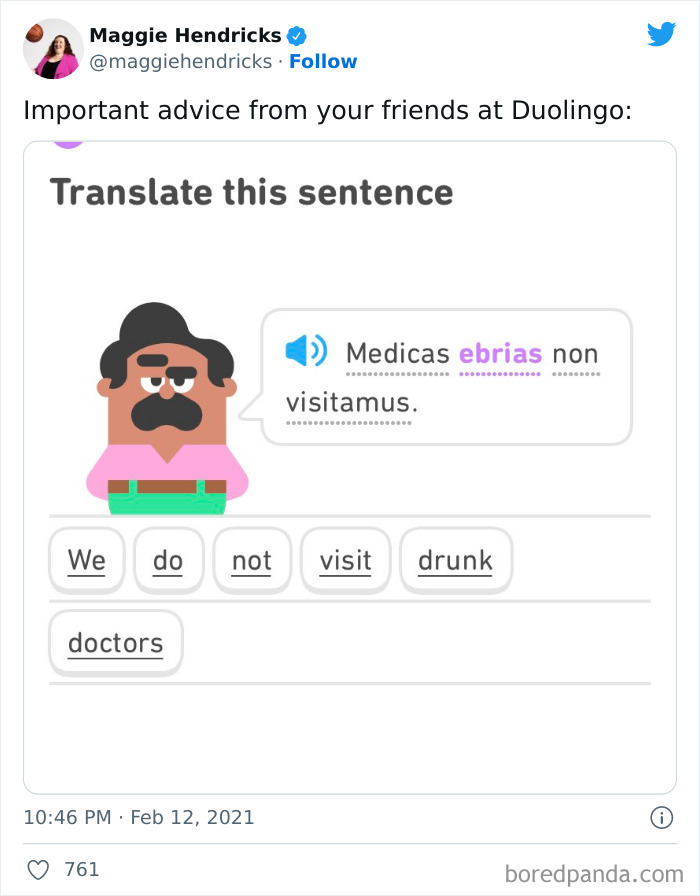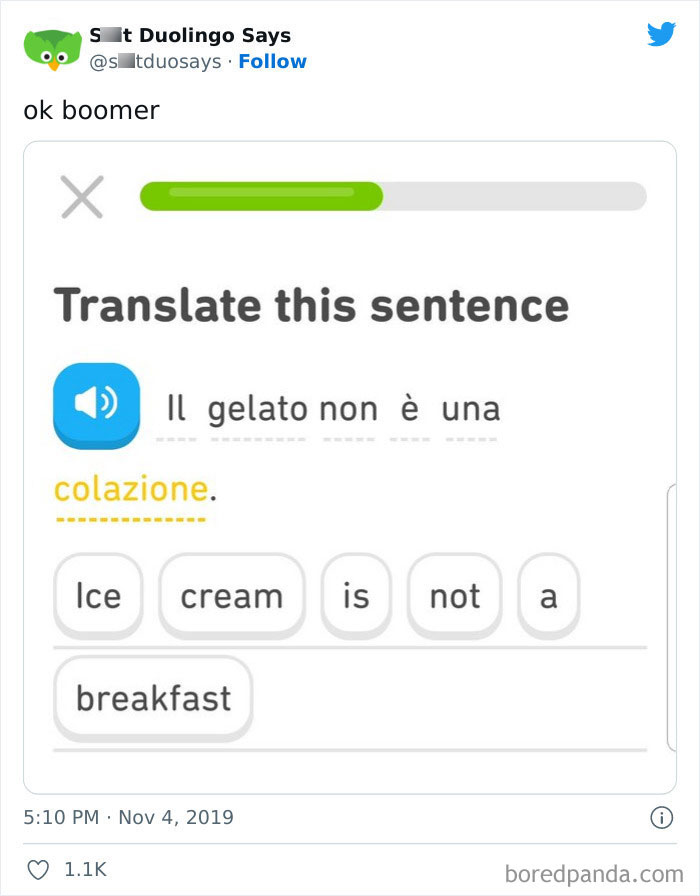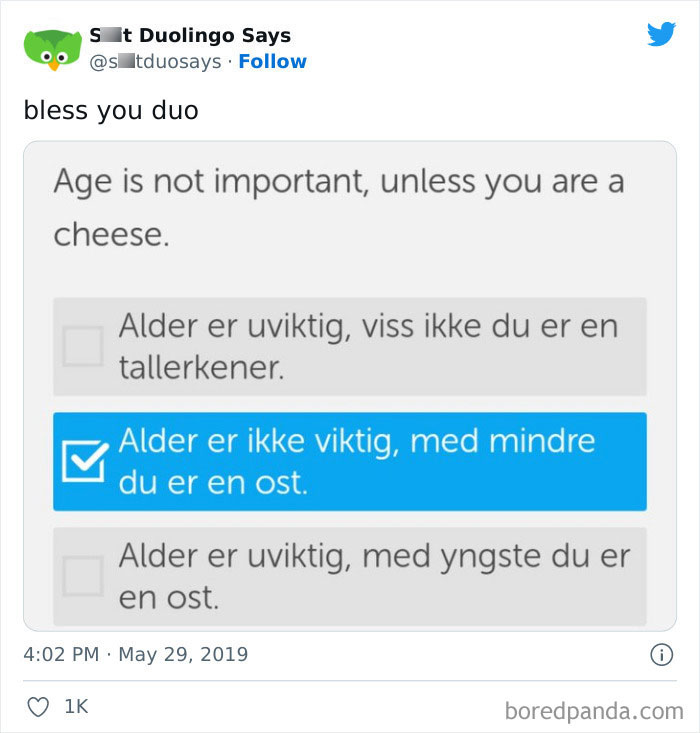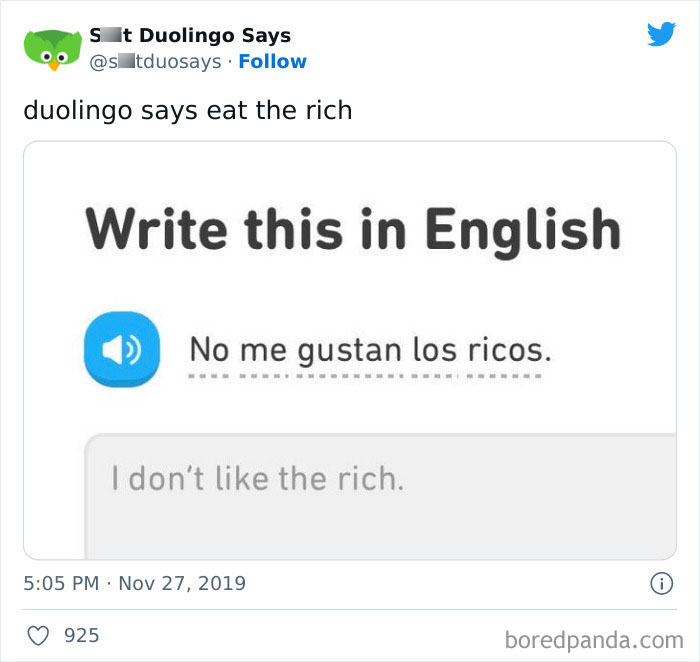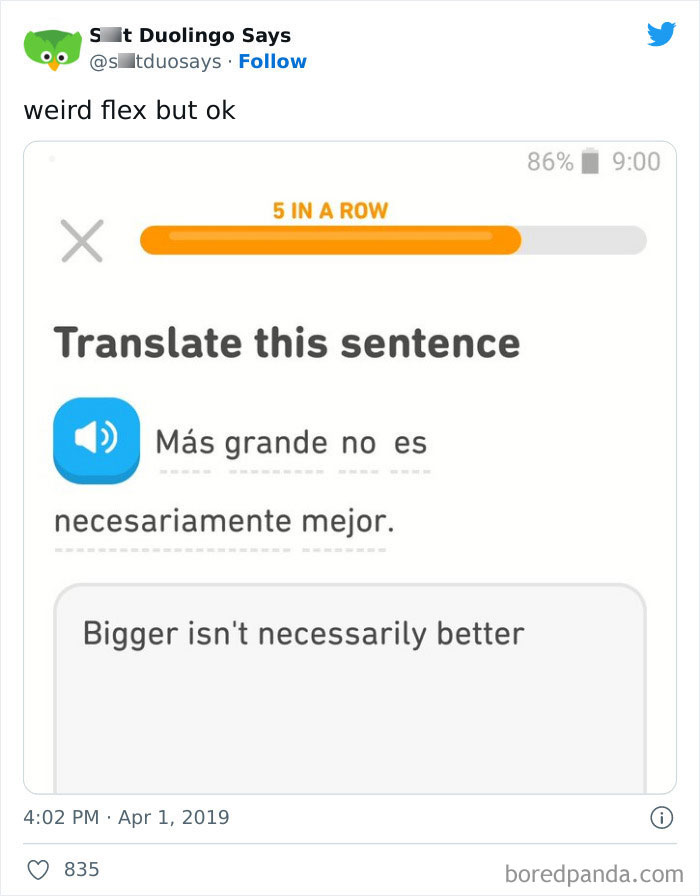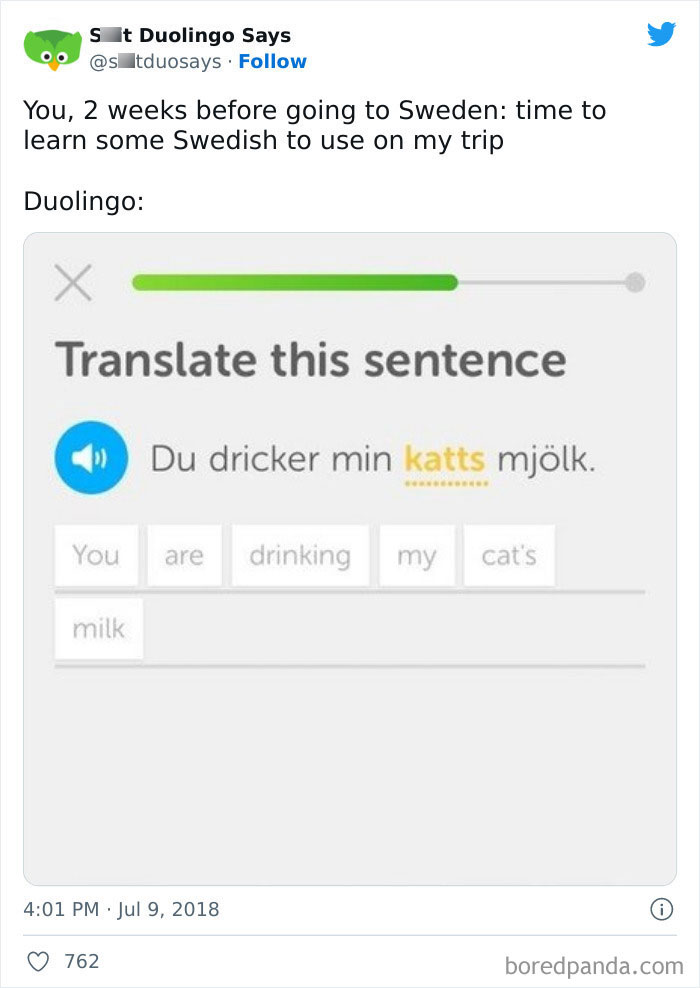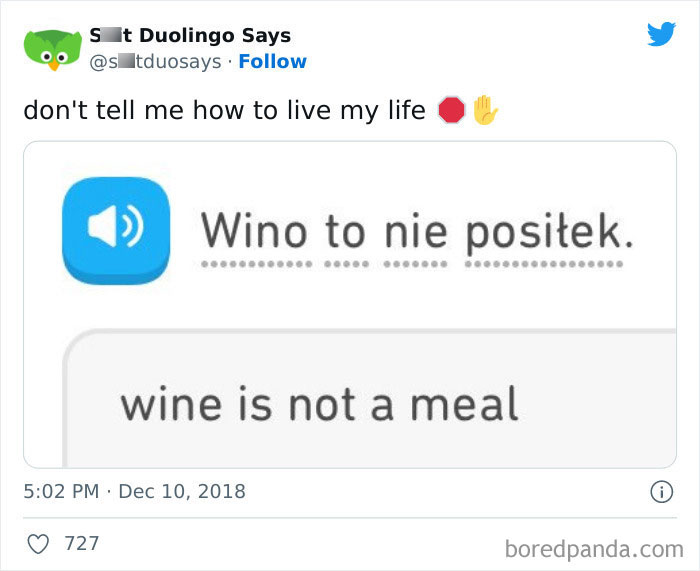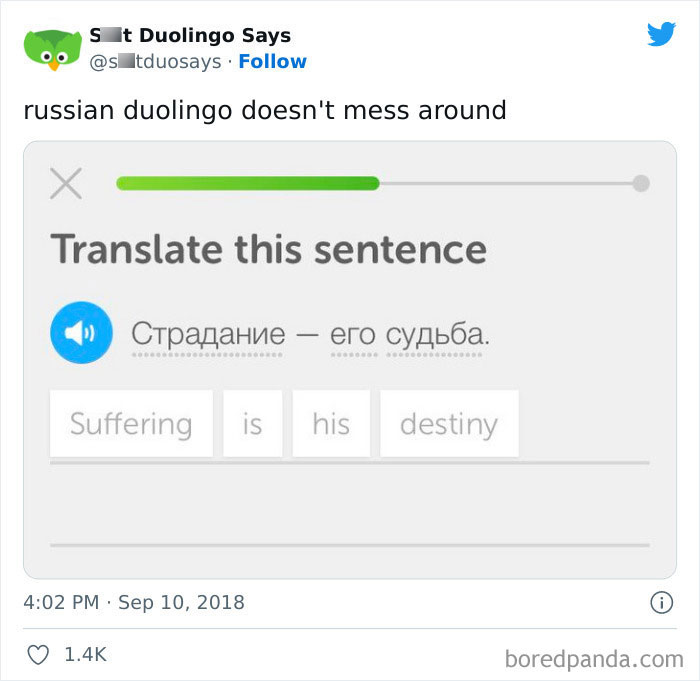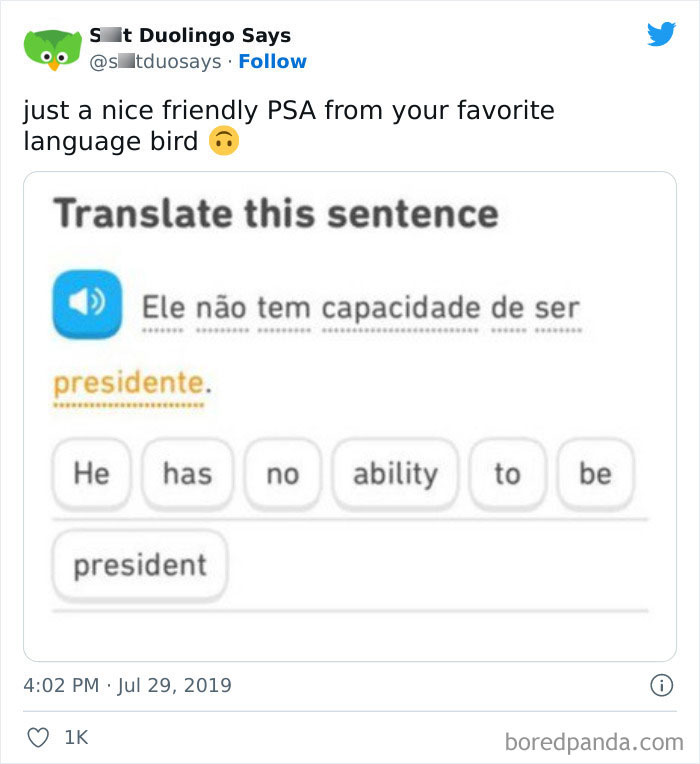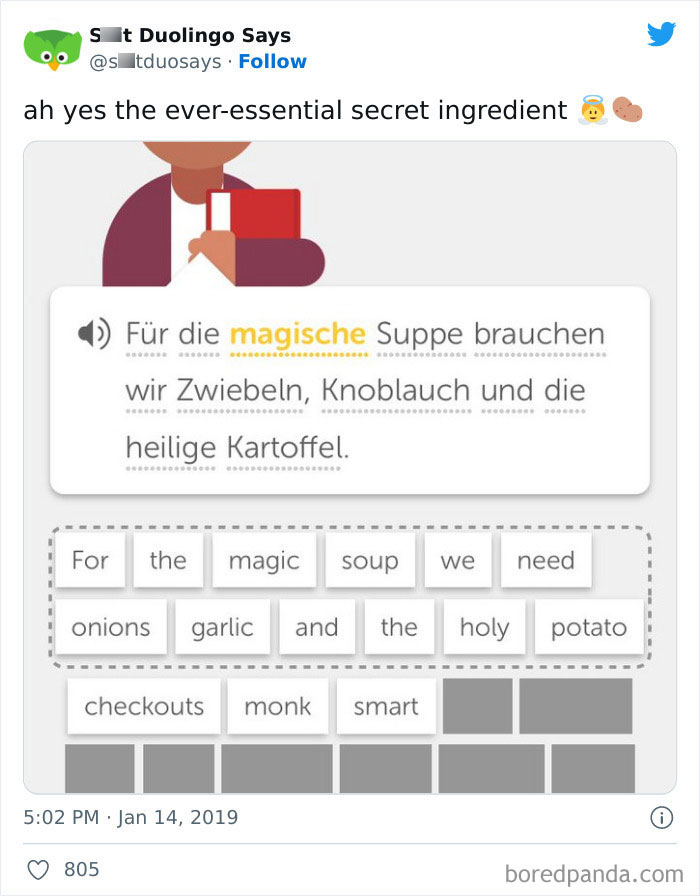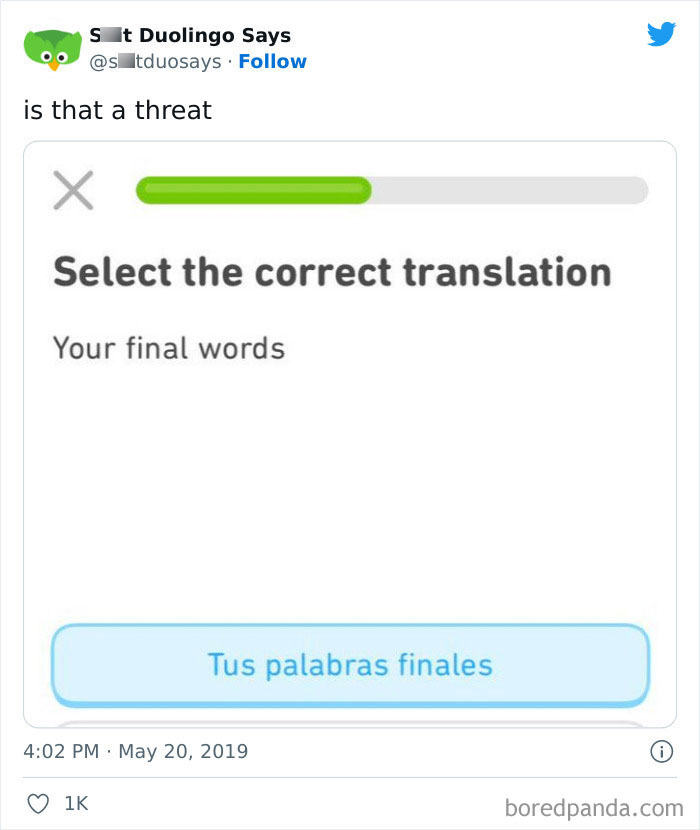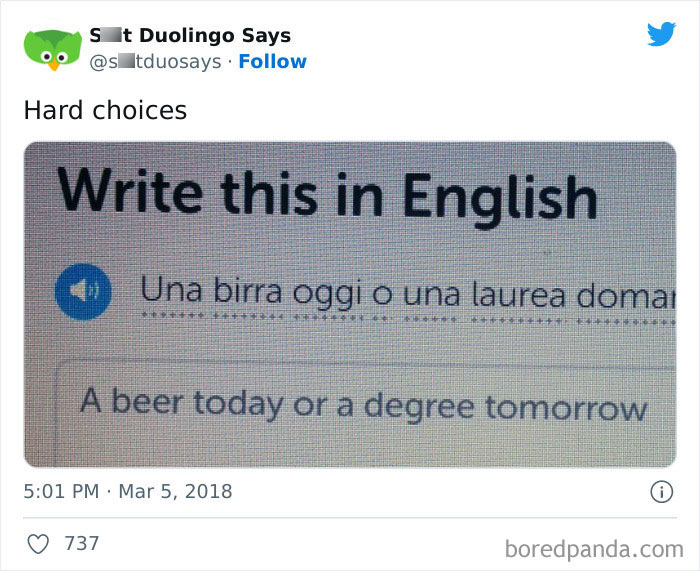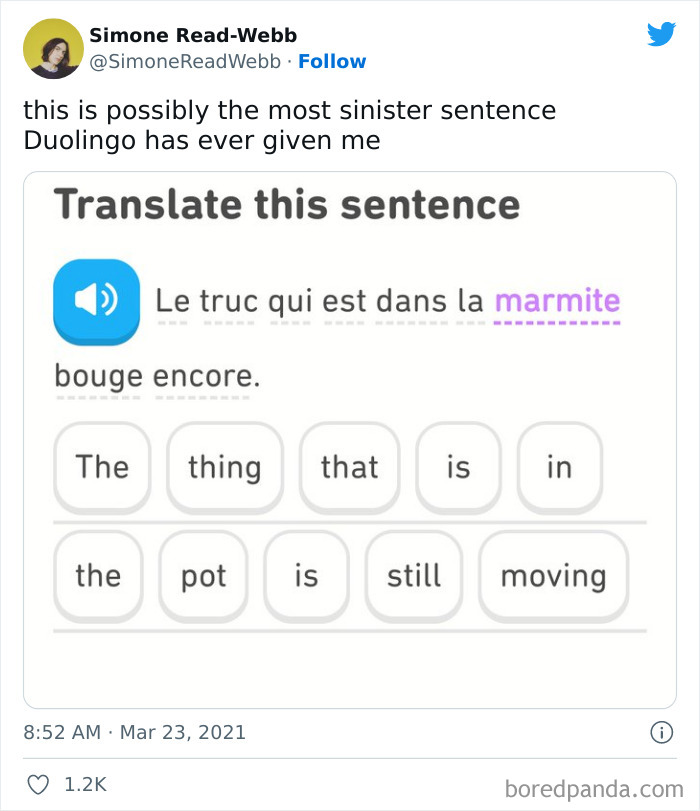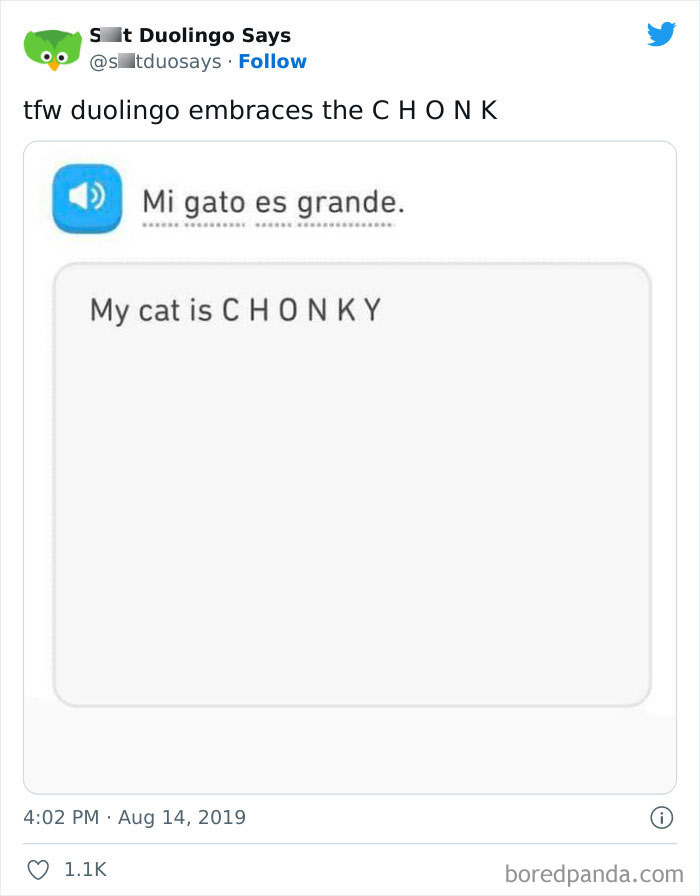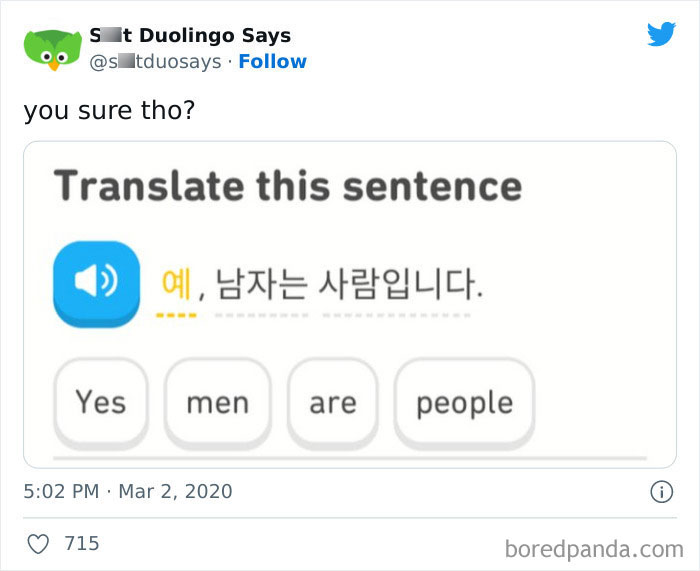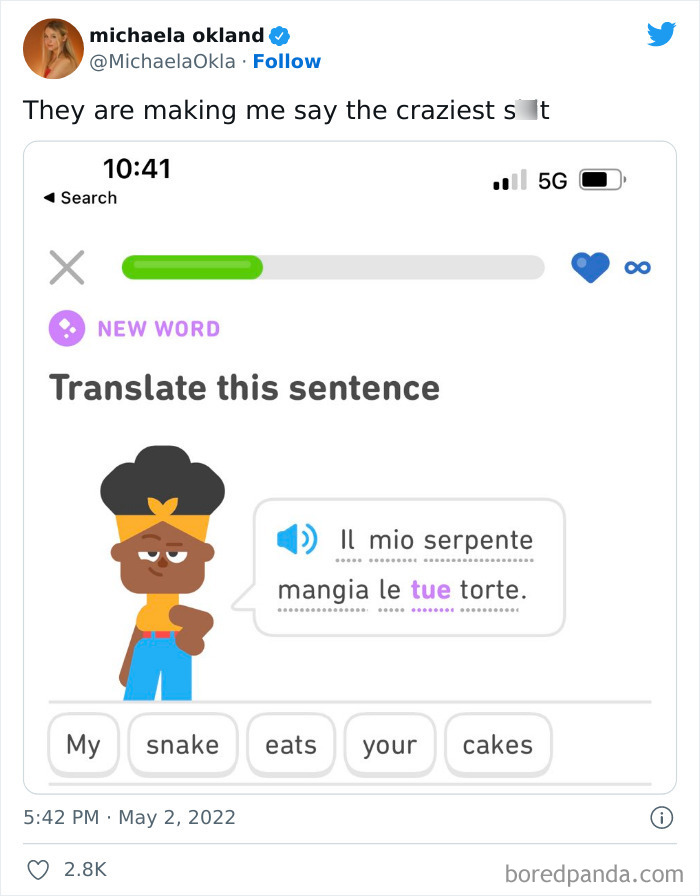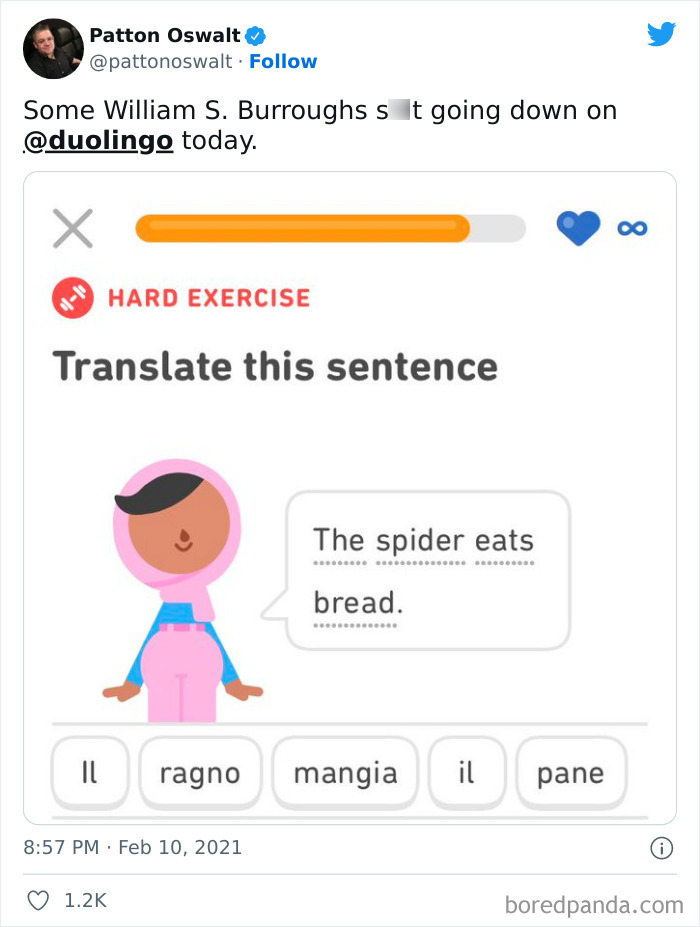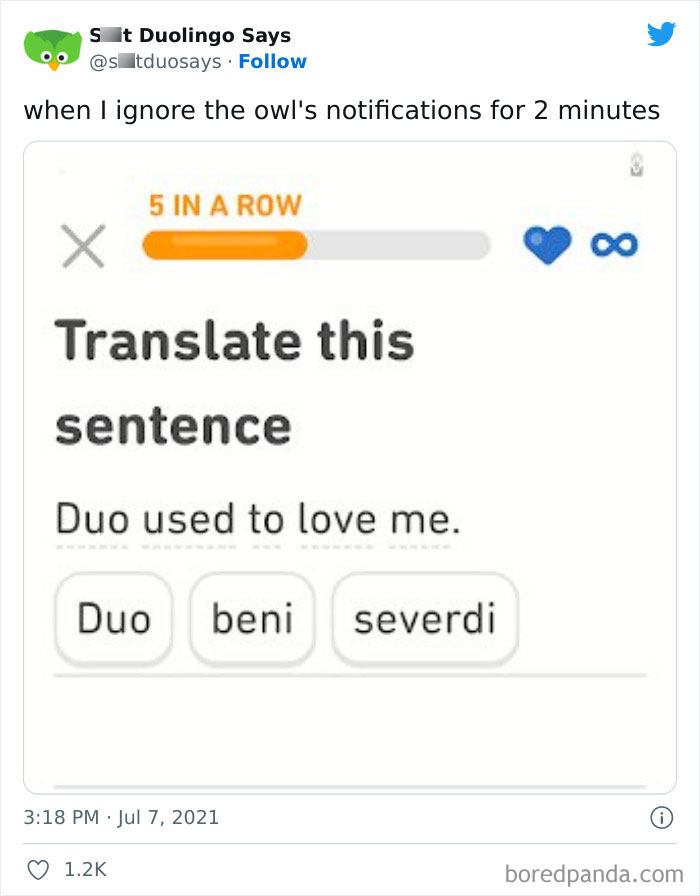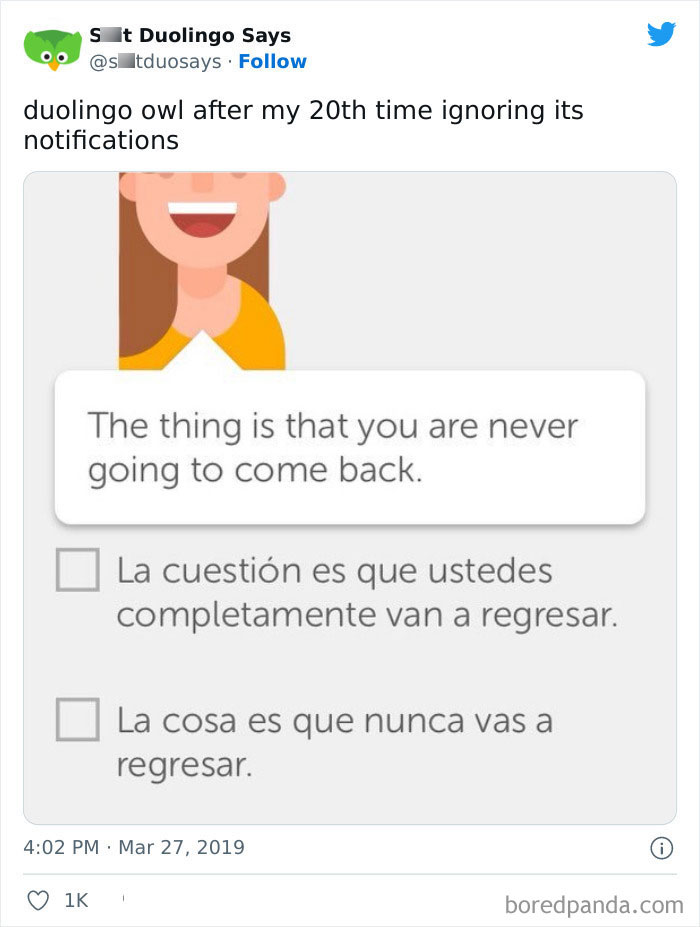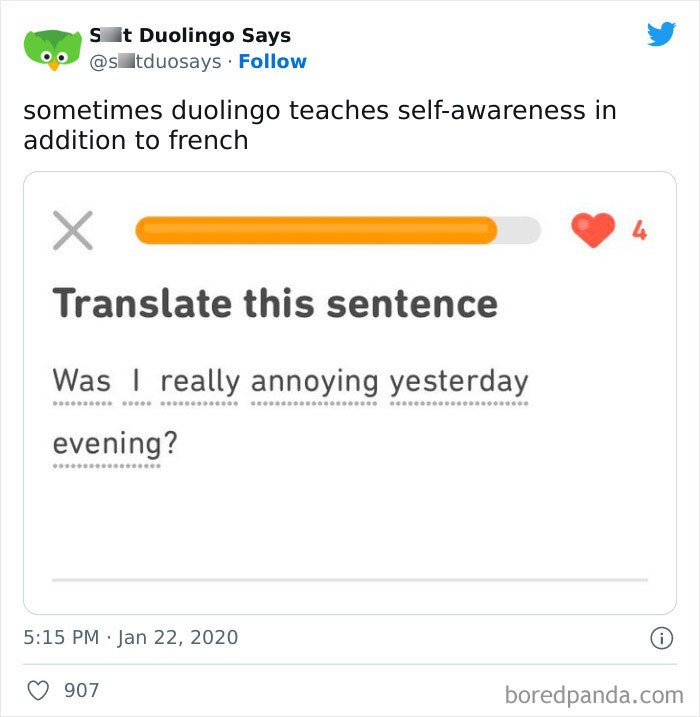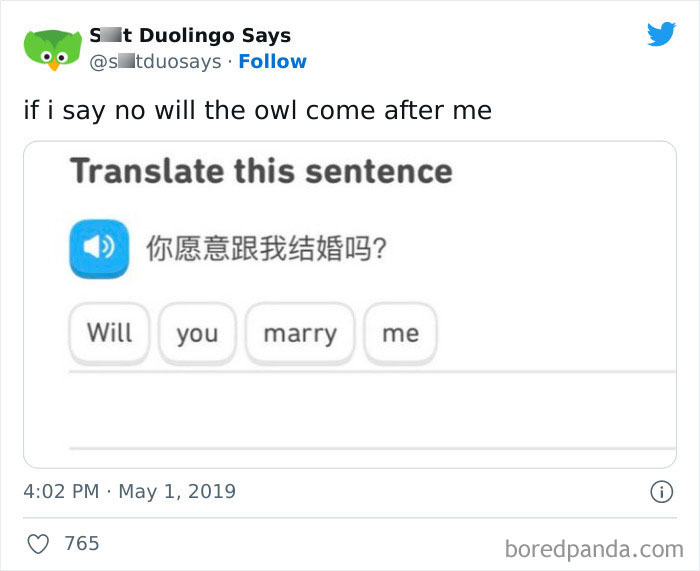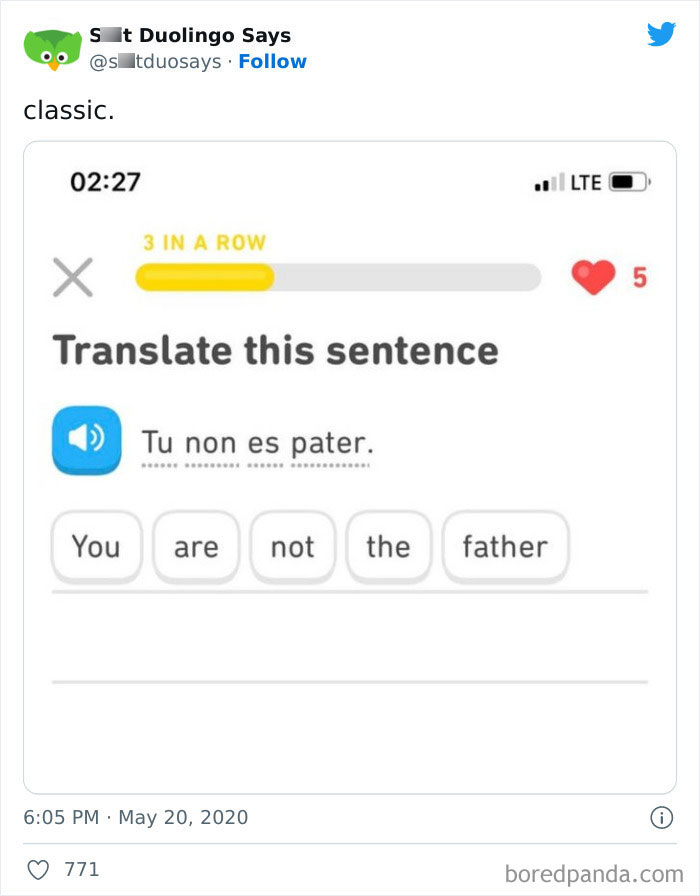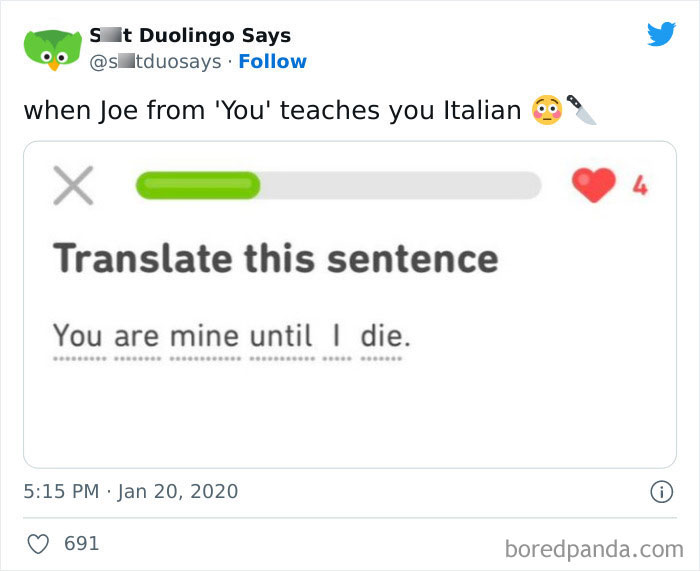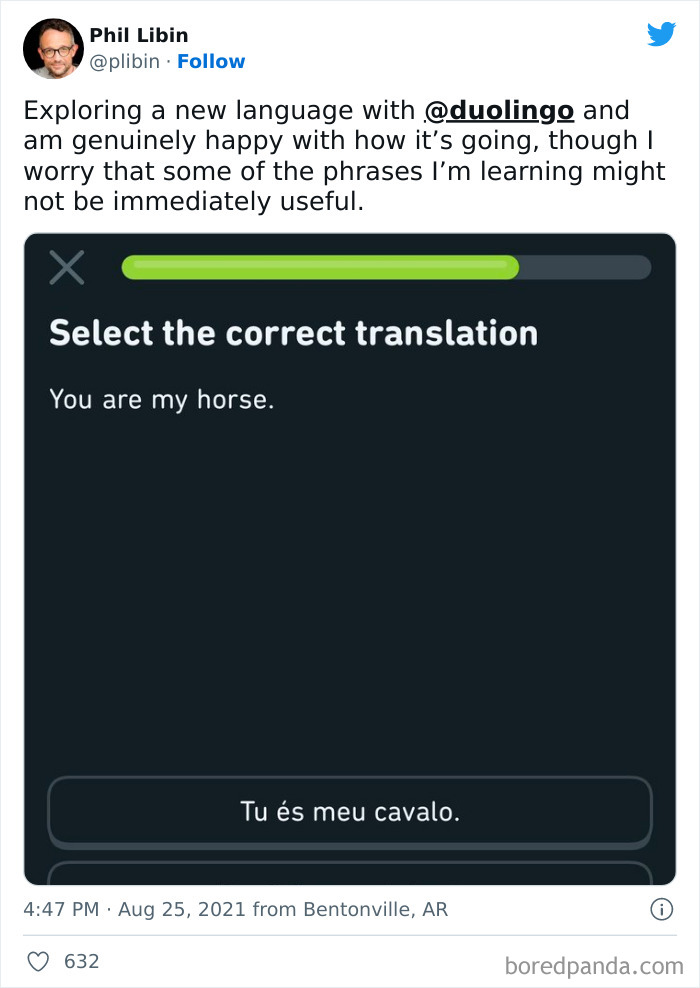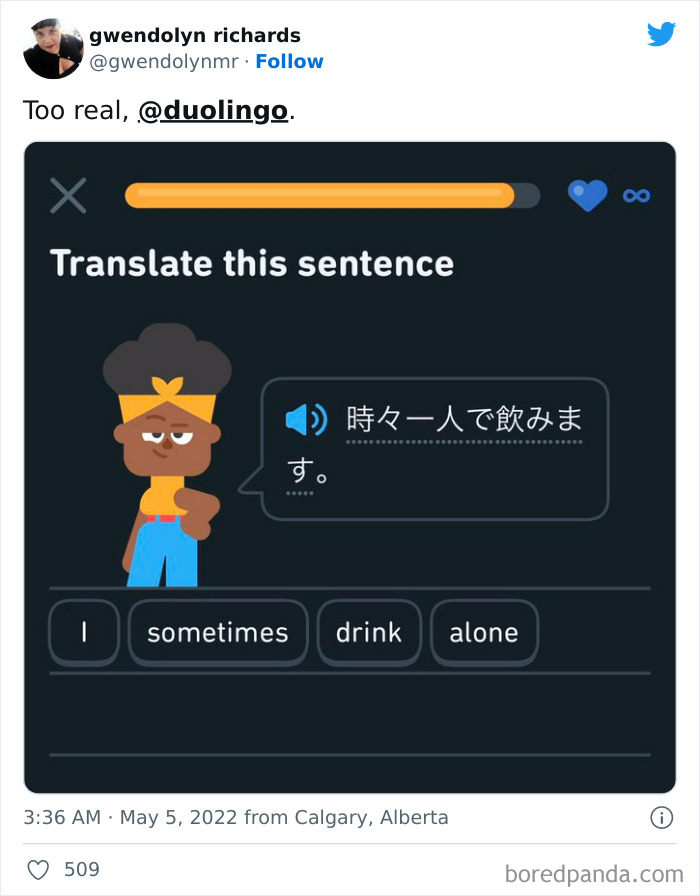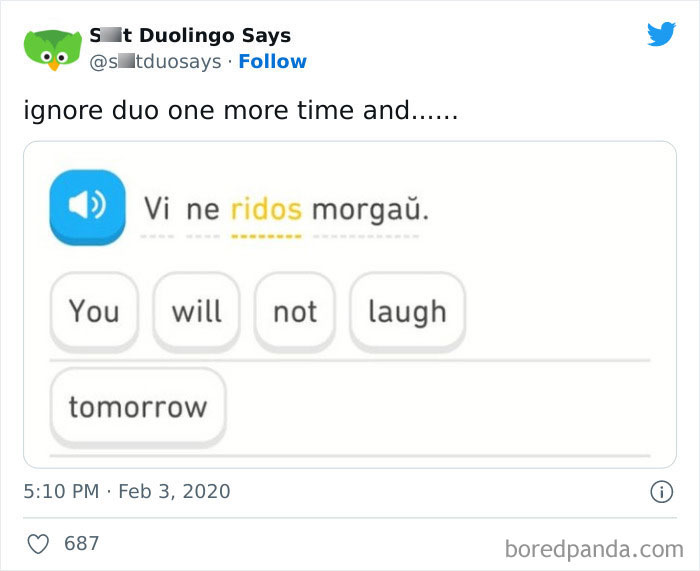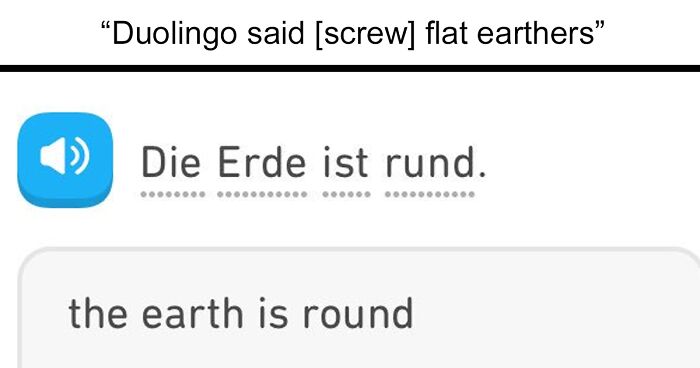
“Linguistic Gold Provided By Duolingo”: 40 Of The Funniest And Most Unexpected Prompts Found On The App
Duolingo is a popular language learning platform that gamifies the process, and calls itself an easier, more efficient, and, most importantly, fun way to broaden your communication skills.
The last point seems really important to the company and it puts a lot of effort into it. Just how much? Well, let's take a look at the Twitter account '[Stuff] Duolingo Says' to answer that question.
It's like an online archive of the funniest, silliest, and downright weirdest prompts Duolingo's owl has thrown at people.
More info: Twitter
This post may include affiliate links.
Because you skipped your Spanish lesson and broke your streak.
Load More Replies...The traslation is correct, if anyone was wondering. It's in Norwegian, which is my first languange.
Duo Owl: Duo misses you. You haven't practised your Norwegian in 20 days. What? That shiny knife in my hand? Ahh, don't worry about that.
Lesson of the day: don't try translating just before bedtime unless you are happy sleeping with all the lights on.
As a person who does not understand what is the original sentence, I don't exactly get it.
It says: There is a man with a knife behind the curtain :D
Load More Replies...You would think these sentences are glitches. Results of the program code going rogue. But even though the team at Duolingo are serious about learning, that doesn't mean they don't have fun while they're at it.
"You've probably seen us get pretty silly on social media and especially on April Fools' Day, and maybe you've encountered our quirky sense of humor in your own lessons, too," they wrote in a 2021 blog post.
"In 2020, some of our goofiest sentences suddenly took on new meaning in the context of a global pandemic, and in December 2020, Duolingo learners nominated their favorite sentences to be in the running for the Most 2020 Phrase."
reminds me of the meme where a little boy in a car is reading : i hate everything lel-637feb...57a3ec.jpg 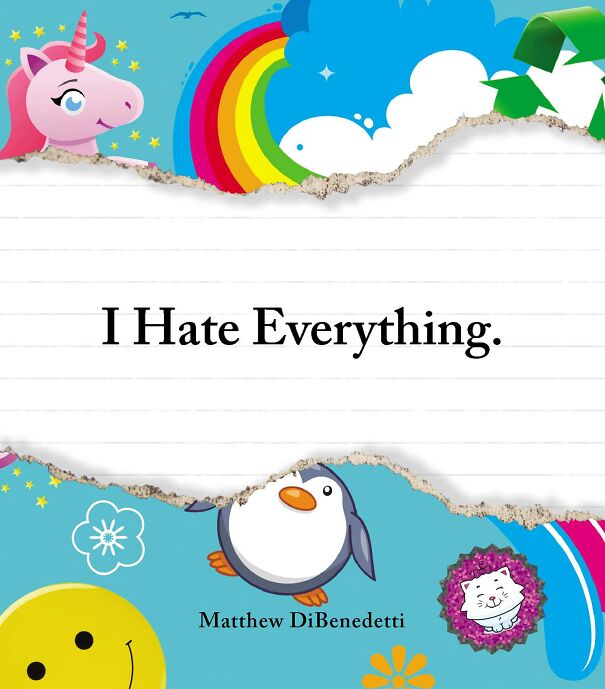
Someone's learning Hebrew, I see... I read the Hebrew version first, the translation is pretty good.
Duolingo daily reminders are always mildly threatening and/or sassy.
Load More Replies...Well, I certainly hope that you're bringing breakfast and making Mimosas.
Is no one gonna talk about all the notifications????????
I am happy to see this thread. I have been using Duolingo for years and honestly I've always worried about the person that does the Dutch lessons. And their friends, family and people they encounter. And wondered where they buried all the bodies. I.e.: Is this an important body part? All the body parts are in the right place. And so on.
idnc abt duolingo coming to my house i will go all the way to california if i have to before he gets there. Or i will yeet him to Russia and he can learn Russian for me. >:D
I mean, the knife is the one what was stabbing the person, not the person's hand
Then he fell onto the ground and did sit ups into my knife three more times
Load More Replies...Men hun fangede mig på disken (det var ikke mig), Så mig banke i sofaen (det var ikke mig)
Is Duo just stealing lines from Nordic noir films now?
It was no surprise that many of the contenders were true oddballs, such as "Today I will gaze into the distance and cry as well."
But in the end, the winner was clear: "I am eating bread and crying on the floor" was voted by learners as the Most 2020 Phrase on Duolingo, and to celebrate, the company created a limited-edition tote bag in the perfect size for carrying loaves and tissues.
The Yiddish actually says "my dear child", not my precious dumpling. The program is confused between kindela (child) and k'nedelach (dumpling).
So you're saying it should be "Can I eat you, my precious child?"? Not sure how to feel about this one, I mean dumplings sound more yummy than children.
Load More Replies...Pfft. My Duolingo username is spookyDumplings, this makes it 10x funnier
yes i buried the body it was just the head and hands
Load More Replies...I hate it when that happens.. Misplaced bodies lead to so many annoying questions..
Reading this on the 16th anniversary of my friend being found in a suitcase dead is not the deja vu I wanted
This is actually from a nonsensical Swedish joke, except it's supposed to be the eye. I remember it from a nonsensical Swedish website from the 90's, back when the Internet was new. The joke was this: Two moose were flying together. One said "you have a cinnamon roll in the eye" the other one said "what?" The first one repeated "you have a cinnamon roll in the eye." To which the other one replied: "I can't hear you, because I've got a cinnamon roll in my eye!" Swedes. We're a weird bunch.
Only Swedes will appreciate this excellent trivia. I had forgot about it!
Load More Replies...But what's really going on with these quirky sentences is that Duolingo believe they provide actual learning value.
"At Duolingo, we know that the best learning happens when you're engaged and excited about what you're studying. After all, there are a lot of demands on your attention!" they said.
"That's why we want our courses to include all different kinds of language: the expressions and phrases that you'll memorize (mucho gusto, qué tal) as well as useful patterns that you'll see all over the language (like verb endings). Finding silly and surprising sentences in a lesson keeps you on your toes and engaged in your learning."
Keep it up and you're going to have a bad time involving you, me, an onion, a banana leaf, and three batteries.
I have 2 onions and a carrot, that i like to use. If you know what i mean ;)
Well maybe the cows aren't grappling with anxiety and ADHD professor.
I had a teacher in my freshman year of high school that straight up believed she was teaching us spanish. She was teaching us Brazilian and passing it off as spanish. I have never had such high anxiety as I did then.
Load More Replies...And door k**b is more intelligent then cow.. So just imagine how dumb the students are.
Not exactly but it kind of means the same thing
Load More Replies...My mom when I get a C+ instead of a B- bc I had a 79.999999999 and my teacher doesn't believe in rounding (this hasn't happened to me luckily)
"Quirky sentences also ... work as a grammatical 'anchor,' helping you remember key examples of essential grammar concepts. Right there, hidden in plain sight in sentences about horses, apples, and mothers-in-law, are verb conjugations, word order rules, and vocabulary that can be swapped in and out to make even more sentences than just the silly one you see."
Learning from these sentences apparently helps you remember the grammar for next time you need it, even if you're laughing (or rolling your eyes) through the lesson.
But I don't want there to be a law that you must do your spanish lessons every day!
Load More Replies...This is appropriate to ask of any government in any country, at just about any time.
So tired of the White House Press Sec who stutters more than anything.
Biden hasn't told a lie yet, technically speaking. He only regurgitates what he hears in the ear-piece. Salute the Marines!
Load More Replies...I still don't want them crawling on me though. We can sit across from each and both cry. Problem solved.
Spiders are my favorite animal. I’ve gotten good at snatching flies out of the air so that I can feed them to my favorite spiders.
No word is adequate to express how upset I’d be if someone helped a spider to suck the juices out of me. I’m toying with “chagrined” but that just seems to fall short.
Load More Replies...The singular form of pavouci is actually pavouk.
Load More Replies...HEYY! would you rather have a world with mosquitoes flying around the house stinging you or have spiders eating them unnamed-63...0f-png.jpg 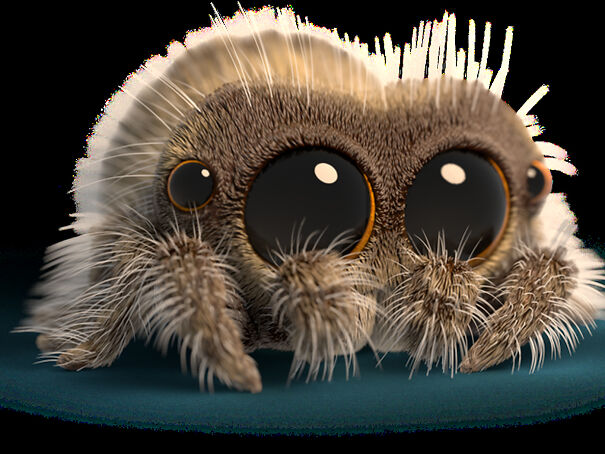
I knew somebody was going to reference that character "???"
Load More Replies...Should someone check on Duo's Norwegian staff? I'm really starting to worry about them.
It was installed there to clean your butt. Smart toilet. Don't be worried about that hand.
When the staff at Duolingo write lessons, they always start by thinking about what you'll want to be able to do with the language (a "learning objective").
"Our first goal is to create a learning experience that will allow you to practice the kinds of conversation that you'll have in everyday life," they explained. "Next we plan out the words and grammar that will get you communicating, and then we start having a little fun. Our teams of talented writers and language teaching experts write hundreds of sentences, following a slew of constraints that you can read more about here."
I have been doing Norwegian course, looking forward for these jems😃😃😃
Load More Replies...There's a joke about the pecking order in here somewhere, i just can't find it Edit: Guys your replies are all amazing lol
Doulingo is having some existential crisis going on and we should look out for that scary little owl
👽 also have existental crisis (sorry for my bad human 👽👽👽)
Load More Replies...I am starting to notice a theme in DuoLingo's Norwegian phrases-- it entails sharp knives, hands emerging from toilets, and existential crises.
I'm learning the Norwegian course, I'm looking forward to finding these
"As our writers and language experts develop lessons, they work on balancing really useful phrases that you can use immediately, like ¿Cómo se llama tu hijo? 'What is your son's name?' with the quirky and fun sentences that stick in your memory."
"We want our content to be as full of personality as we are! Our writers' first priority is always the lesson's learning objective, but after that, they are encouraged to develop humorous, interesting content, with some quirks mixed in."
In Russia, lesson learn you! *laughs in Russian*
Load More Replies...I'm learning korean so I can converse with my halabeoji (grandfather) and one of the things said take your pants off
Hmmm I think it should have been "Chuck Norris" instead of Russia
Given the chaos we have had i Sweden recently, with election, broken nuclear plants and lack of electricity, many may want to jump a window. Please open first as broken windows will cause issues with a already very expensive heating.
Thanks, Duo, you saved me! I was just going to do that, after I completed my 50 Swedish lessons!
I am a mushroom. I make italian plumbers big and strong :D
Load More Replies...גם אני פטרייה, חביבי... איך החיים שלך? אני מקווה שהכל טוב 😁
hooray 3 mushrooms!!!! im not feeling alone anymore
Load More Replies...Lmao I'm also taking czech on duo and laughed so hard when I got this sentence!
And it appears to be working. According to a study of 225 Duolingo learners from the U.S. who had reached the end of Unit 5 (the beginner-level section of the course), they performed as well on reading and listening tests as students who had completed four semesters of university language instruction.
Another study looked at 340 learners from across the globe who had reached the end of Unit 7 (just halfway through the intermediate material of their course) and found that they completed reading and listening tests just as well as students who had gone through five semesters of university language instruction.
So kudos to silly sentences!
This one caught me off guard. I can't stop laughing. "Do you understand? "
¡Soccoro! ¡Estamos perdidos! Los gatos van a apoderarse del mundo.
HUH? FIRE THE PET TREATS! START THE BATH!
Load More Replies...So all of my ranting to my cat when i was home alone.... THE CAT KNOWS. IT KNOWS EVERYTHING.
No. We just only found out about it; they've known for a long time. Their plotting may hasten now
"I don't know who you are. I don't know what you want. If you are looking for ransom, I can tell you I don't have money. But what I do have are a very particular set of skills, skills I have acquired over a very long career, skills that make me a nightmare for people like you. If you let my daughter go now, that'll be the end of it. I will not look for you. I will not pursue you. But if you don't, I will look for you, I will find you, and I will kill you."
I'm tempted to use the middle part with recruitment agencies!
Load More Replies...Sounds a lot like the creepy guys that hit on me on Instagram.
me when any member of the EBU staff atp (they are running Eurovision into the ground)
Maybe it’s that beautiful cat who learnt English four years ago, from the posts above.
My kitten who will walk on everyone and everything would like to disagree
Not only did he learn English four years ago, but he also mastered the piano
This is much better than what I get. Mine just does this: 273150614_...6e36a6.jpg 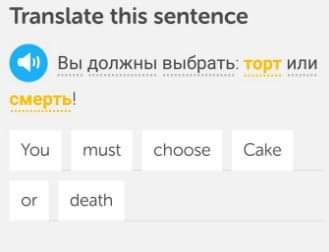
dont worry, im sure youll find the right cat eventually
Load More Replies..."Forgive me Father for I have sinned" is just a different way to say "Daddy, I've been naughty".
The exclamation point at the end of the sentence really hammers it in.
*zooms up close to Duolingo's face and turns to right at same time*
Load More Replies...Translation from Indonesian: 'wrong question I exist, why why'. It should be translated: 'mengapa saya ada'.
The translation isn't done yet in this one. The student needs to pick the right words in right order from the ones listed (on easier levels)
Load More Replies...I love the pink ladies in the refrigerator in Duo Irish, and how Màiri steals underwear in Duo Scottish Gaelic.
In hindi, people say 'चंदा मामा' which actually means uncle moon
I believe it is traditional in Amsterdam to hide the body of the Prime Minister by eating him.
You gonna need some help with that tho, like they say: It takes a village (to kill and eat the prime minister) 😅
Load More Replies...That is our morning routine here in Amsterdam: get up, drink some coffee, hide the bodies and go towork.
I didn't MEAN to push that guy out the window... I just gave him a teensy shove and he fell out all on his own! Yeah, totally!
Thank you so much for holding down the fort while I was out murdering civilians. Time to take back my throne.
geef mij mijn kaas (if this is wrong i'm sorry i've only been learning dutch since last year)
Size doesn't matter. It is how you use it.
Load More Replies...I have gotten: "I am the cheese" several times in the Norwegian course, that must be what happens when you eat too much cheese. (If anyone's interested the Norwegian translation is "jeg er osten"
Okay but then neither are muffins, pancakes, waffles, or French toast
"man, this soup is amazing, what's in it?" "Oh, you know, onions, garlic, a holy potato or two"
I REFUSE TO BE MURDERED CAUSE I MISSED A FRENCH LESSON!!! YOU WONT TAKE ME BEFORE I DO!!!!
yes, especially when you kept telling me to practice French
Almost! Sei mio finché non muoio. Tue es is Spanish and mourire is French 😄
Load More Replies...I'm a language teacher and I use weird sentences a lot. "I have been eating a shoe" should make the perfect continuous stick to mind a little better. It's also good to throw weird stuff in exams every now and then. It makes sure you really know the grammar and the vocabulary, as you can't just deduce half of the sentence based on the bits that you do understand.
I've gotten two weird ones repeatedly (Czech); "While he sleeps, she is crying" "There is a body in the fridge. Don't look."
Duo can definitely be strange. The "basic words" lessons in Finnish include "The Norwegian cat is a viking" and "I am crying and the onion is laughing." Also some of the stories in Spanish are....interesting. Like the one about Junior telling his dad he wants to be a lion tamer when he grows up "because you're a lion tamer and I want to be like you!" The dad asks, "Why do you think I'm a lion tamer?" and Junior says, "I saw a whip and leather pants in your closet." "Er, right, I am a lion tamer. I just forgot to tell you."
duolingo is the reason that one of the few sentences in Welsh I can say is 'I work as a female secretary on a farm
Ah, the green owl. I never got any weird sentences, but I did get a lot of stress and a realization that I couldn't understand s**t of spoken french; I just relied on reading and context.
Latin is hilarious. I won't even do some of the lessons near my husband. Drunk parrots are a favorite subject.
Oh, and everybody runs away when Iain is coming (also in Scotland).
I love that Ireland has pink ladies in refrigerators and Màiri steals underwear in Scotland.
I'm a language teacher and I use weird sentences a lot. "I have been eating a shoe" should make the perfect continuous stick to mind a little better. It's also good to throw weird stuff in exams every now and then. It makes sure you really know the grammar and the vocabulary, as you can't just deduce half of the sentence based on the bits that you do understand.
I've gotten two weird ones repeatedly (Czech); "While he sleeps, she is crying" "There is a body in the fridge. Don't look."
Duo can definitely be strange. The "basic words" lessons in Finnish include "The Norwegian cat is a viking" and "I am crying and the onion is laughing." Also some of the stories in Spanish are....interesting. Like the one about Junior telling his dad he wants to be a lion tamer when he grows up "because you're a lion tamer and I want to be like you!" The dad asks, "Why do you think I'm a lion tamer?" and Junior says, "I saw a whip and leather pants in your closet." "Er, right, I am a lion tamer. I just forgot to tell you."
duolingo is the reason that one of the few sentences in Welsh I can say is 'I work as a female secretary on a farm
Ah, the green owl. I never got any weird sentences, but I did get a lot of stress and a realization that I couldn't understand s**t of spoken french; I just relied on reading and context.
Latin is hilarious. I won't even do some of the lessons near my husband. Drunk parrots are a favorite subject.
Oh, and everybody runs away when Iain is coming (also in Scotland).
I love that Ireland has pink ladies in refrigerators and Màiri steals underwear in Scotland.

 Dark Mode
Dark Mode 

 No fees, cancel anytime
No fees, cancel anytime 






